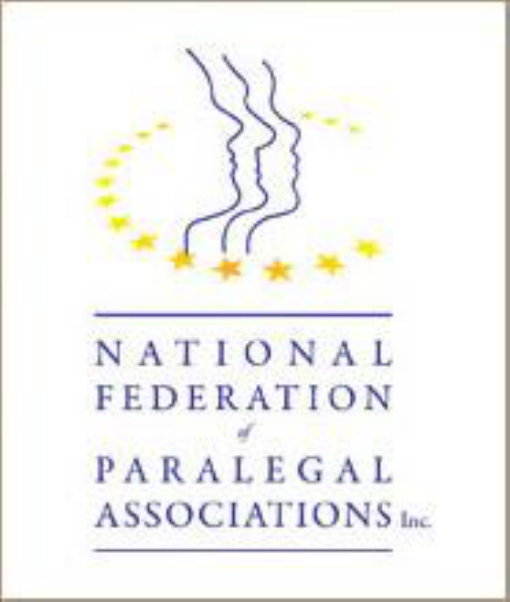
Paralegal Regulation by State
Updated October 2019
NFPA Regulation Review Committee
Tom Stephenson, ILAP; Coordinator
2
Table of Contents
Table of Contents ........................................................................................................................................ 2
Regulation by State ..................................................................................................................................... 3
Alabama ................................................................................................................................................................3
Alaska ....................................................................................................................................................................3
Arizona ..................................................................................................................................................................4
Arkansas ................................................................................................................................................................4
California ...............................................................................................................................................................5
Colorado ................................................................................................................................................................6
Connecticut ...........................................................................................................................................................8
Delaware ...............................................................................................................................................................9
District of Columbia ...............................................................................................................................................9
Florida ...................................................................................................................................................................9
Georgia ................................................................................................................................................................ 11
Hawaii ................................................................................................................................................................. 11
Idaho ................................................................................................................................................................... 12
Illinois.................................................................................................................................................................. 12
Indiana ................................................................................................................................................................ 13
Iowa .................................................................................................................................................................... 13
Kansas ................................................................................................................................................................. 13
Kentucky ............................................................................................................................................................. 14
Louisiana ............................................................................................................................................................. 15
Maine .................................................................................................................................................................. 16
Maryland ............................................................................................................................................................. 16
Massachusetts ..................................................................................................................................................... 16
Michigan ............................................................................................................................................................. 17
Minnesota ........................................................................................................................................................... 17
Mississippi ........................................................................................................................................................... 18
Missouri .............................................................................................................................................................. 19
Montana.............................................................................................................................................................. 19
Nebraska ............................................................................................................................................................. 21
Nevada ................................................................................................................................................................ 21
New Hampshire ................................................................................................................................................... 21
New Jersey .......................................................................................................................................................... 22
New Mexico ......................................................................................................................................................... 23
New York ............................................................................................................................................................. 24
North Carolina ..................................................................................................................................................... 26
North Dakota ....................................................................................................................................................... 26
Ohio .................................................................................................................................................................... 27
Oklahoma ............................................................................................................................................................ 27
Oregon ................................................................................................................................................................ 27
Pennsylvania ....................................................................................................................................................... 29
Rhode Island ........................................................................................................................................................ 30
South Carolina ..................................................................................................................................................... 30
South Dakota ....................................................................................................................................................... 31
Tennessee ........................................................................................................................................................... 32
Texas ................................................................................................................................................................... 33
Utah .................................................................................................................................................................... 34
Vermont .............................................................................................................................................................. 35
Virginia ................................................................................................................................................................ 36
Washington ......................................................................................................................................................... 36
West Virginia ....................................................................................................................................................... 39
Wisconsin ............................................................................................................................................................ 40
Wyoming ............................................................................................................................................................. 41
Committee Members ................................................................................................................................. 41
Revision History......................................................................................................................................... 42
Citations .................................................................................................................................................... 42

3
Regulation by State
State
Region
Definition
Type of Regulation
History
Alabama
III
Alabama Rule of Professional Conduct 5.3
incorporates the standard ABA model code for
Responsibilities Regarding Nonlawyer Assistants. It
requires that lawyers supervise and instruct their
employees and that they accept responsibility for the
professional actions of their employees. However, it
requires no educational or certification process for
paralegals. Therefore, aspiring paralegals may pursue
employment by completing educational coursework,
such as a certificate program, an associate’s degree or
a bachelor’s degree, or by finding an employer who
provides on-the-job training.
1
The 1975 Code of
Alabama 6-5-572: Refers to paralegals/legal
assistants/legal secretaries in the context of
employment by an attorney. Specifically, it states that
a legal service provider is anyone licensed or engaged
to practice law in the state.
2
Additionally, Rule 7.6
Professional Cards of Nonlawyers specifically states
information must clearly define the role of nonlawyer
as “Legal Assistant.” Comments section includes
paralegals specifically, among others.
3
None
2019: No update (Tom Stephenson)
2017: No update (Erin Melville)
2016: No update (Mary Ann Myskiw-Jones)
Alaska
I
Restyled in April 2009 under Supreme Court Order
1680 (SCO 1680) Alaska Rule of Professional Conduct
5.3 Responsibilities Regarding Nonlawyer Assistants:
Changed reference in comment from
“paraprofessionals” to “paralegals” as one type of
nonlawyer supervised by attorneys (See comment [1]).
The rule states that lawyers must directly supervise
their assistants and are responsible for their
assistants’ conduct.
4
None
2019: No update (Tom Stephenson)
2017: No update (Mariela Cawthon)
2016: No Update
2015: The University of Alaska at Anchorage offers ABA-approved
programs for Associate, Bachelor, and Post-Baccalaureate degrees in
legal studies. It is not uncommon for employers to require their
paralegals to have one of these degrees and/or certification with NFPA,
NALA, or NALS, but so far there is no state-wide requirement or
licensing. Sarah Ovsak, President Alaska Association of Paralegals.
2011: Alaska Association of Paralegals solicited support from Fairbanks
Legal Assistant Association for their voluntary Alaska Registered
Paralegal program through the Alaska Bar Rules. Proposal was
presented to the Alaska Bar Association in September 2011, but no

4
State
Region
Definition
Type of Regulation
History
additional information was provided as to the outcome of the proposal
(styled as Paralegal Regulation Rule 44-2). Proposal was for voluntary
Alaska Registered Paralegal through Alaska Bar Rules (overseen by AK
Supreme Court).
Arizona
I
Arizona Rules of Professional Conduct 5.3 incorporates
the standard ABA model code for Responsibilities
Regarding Nonlawyer Assistants.
5
C. "Legal
assistant/paralegal" means a person qualified by
education and training who performs substantive legal
work requiring a sufficient knowledge of and expertise
in legal concepts and procedures, who is supervised by
an active member of the State Bar of Arizona, and for
whom an active member of the state bar is
responsible, unless otherwise authorized by supreme
court rule.
Rule 31 of Rules of the Supreme Court of Arizona, V.
Regulation of the Practice of Law
6
Certification of Legal Document Preparers.
7
2019: Supreme Court of Arizona adopted Admin. Order 2018-111,
creating the state’s Task Force on Delivery of Legal Services, which
recommends changes for legal document preparers and access to
justice focus. Finalized a Report and Recommendations
8
on October 4,
2019 recommending: 1) develop a tier of nonlawyer legal service
providers to provide limited legal services to clients; 2) initiate a
Licensed Legal Advocate Pilot Program to expand legal services to
domestic violence survivors through new nonlawyer legal service
provider; and 3) advance and encourage courts to establish positions
and programs where nonlawyers are available to provide direct person-
to-person legal information to self-represented litigants about court
processes and self-help services. The most sweeping recommendation
of the task force was the elimination of the professional-conduct rules
that prohibit lawyers and nonlawyers from co-owning businesses that
engage in the practice of law.
2017: No update found.
2016: No update found.
Arizona Code of Judicial Administration Section 7-208 – Legal Document
Preparer
9
2005: Effective July 1, 2005, Legal Document Preparers must complete
10 hours of CLE annually. Effective July 1, 2006, LDP must take an
examination.
10
2003: Supreme Court of Arizona adopted § 7-208 of the Arizona Code
of Judicial Administration regarding "Legal Document Preparers"
effective July 1, 2003. This code requires anyone preparing legal
paperwork without an attorney’s supervision must be certified as a
legal document preparer. Legal document preparers can provide
general legal information but can’t give legal advice.
Arkansas
II
Arkansas Rule of Professional Conduct 5.3
incorporates the standard ABA model code for
Responsibilities Regarding Nonlawyer Assistants.
11
None
2019: No update (Tom Stephenson)
2017: No update (Erin Melville)
2016: No update. (Mary Swift)

5
State
Region
Definition
Type of Regulation
History
2015: In 2011, the Arkansas Bar Association created the Paralegal
Committee to “promote the utilization of paralegals in the Arkansas
legal community. The Committee will be responsible for the education
of the members of the Association and development of guidelines for
the utilization of paralegals in legal service.” According to Arkansas
paralegal sources, Arkansas paralegal associations work closely with
this committee.
12
California
I
California Business and Professions Code Section
6456-6456: "Paralegal" means a person who holds
himself or herself out to be a paralegal, who is
qualified by education, training, or work experience,
who either contracts with or is employed by an
attorney, law firm, corporation, governmental agency,
or other entity, and who performs substantial legal
work under the direction and supervision of an active
member of the State Bar of California, as defined in
Section 6060, or an attorney practicing law in the
federal courts of this state, that has been specifically
delegated by the attorney to him or her. Tasks
performed by a paralegal include, but are not limited
to, case planning, development, and management;
legal research; interviewing clients; fact gathering and
retrieving information; drafting and analyzing legal
documents; collecting, compiling, and utilizing
technical information to make an independent
decision and recommendation to the supervising
attorney; and representing clients before a state or
federal administrative agency if that representation is
permitted by statute, court rule, or administrative rule
or regulation.
(d) Every two years, commencing January 1, 2007, any
person that is working as a paralegal shall be required
to certify completion of four hours of mandatory
continuing legal education in legal ethics and four
hours of mandatory continuing legal education in
Document Assistants And Unlawful
Detainer Assistants under CA Business &
Professions Code 6400 et seq.
2019: The State Bar’s Board of Trustee’s directed formation of the Task
Force on Access Through Innovation of Legal Services in July 2018. In its
initial report, the Board wants to propose changes on new technologies
and business models used in the delivery of legal services, with a
special focus on enhancing access to justice for nonlawyers.
14
In July 2019, the Board recommended a menu of options intended to
expand access to legal justice, specifically 1) exceptions to current
restrictions on the UPL; 2) the prospect of non-attorney ownership; and
3) entity regulation.
15
The task force’s proposals would allow the
sweeping changes by modifying restrictions on the unauthorized
practice of law and ethics rules that ban fee sharing with nonlawyers.
2017: In December 2016 CAPA (California Alliance of Paralegal
Associations) announced it will offer a stand alone state specific
certification exam at its Leadership Conference in November 2017. The
designation will be California Certified Paralegal or CCP.
California Assembly Bill 638 was introduced that would allow paralegals
to appear in immigration proceedings under an attorney’s supervision.
It was passed by the House on 5/31/2017 and is in the Senate
Appropriations Committee as of 8/21/2017. (mjs)
2016: The 2015 Report and Recommendations for Closing the Justice
Gap including studying the design of a pilot program, in one subject
matter, for a LLLT type program. The recommendations also include
developing and piloting a court navigator program to provide volunteer
assistance to pro se litigants.
16
2014: Work of Civil Justice Strategies Task Force continues with
preparation of action plan underway in October / November 2014

6
State
Region
Definition
Type of Regulation
History
either general law or in an area of specialized law. All
continuing legal education courses shall meet the
requirements of Section 6070. Certification of these
continuing education requirements shall be made with
the paralegal's supervising attorney. The paralegal
shall be responsible for keeping a record of the
paralegal's certifications.
13
November 2013: State Bar Board of Trustees approves creation of the
Civil Justice Strategies Task Force, tasked to analyze the reasons for the
existing “justice gap,” to evaluate the role of the legal profession in
addressing the crisis, to seek the input of groups who have been
working to expand access to justice to understand what efforts have
worked and which have not been successful, to study creative solutions
being considered in other states and other countries, and to develop an
action plan with recommendations for steps that should be taken to fill
the justice gap and achieve true access to justice in California.
17
March 2013: The Limited License Working Group was created on as a
subcommittee of the Board Committee on Regulation, Admissions and
Discipline Oversight (RAD), with the charge to explore, research and
report back to the RAD Committee regarding the feasibility of
developing and implementing standards for creating a limited license to
practice law and/or the licensing of legal technicians.
18
2001: The California Business and Professions Code defines and
regulates “Legal document assistant” and “Unlawful detainer
assistant”.
19
Definition of Legal Document Assistant does not apply to paralegals
provided that the paralegal does not also perform the duties of a legal
document assistant. Legal document assistants must be registered in
the county in which they provide services.
20
Paralegals are regulated by statute under CA Business & Professions
Code 6450 et. seq. requiring mandatory compliance with educational
standards, and continuing education.
1993: Assembly Bill 1287 proposing to register legal technicians (any
nonlawyer who holds himself or herself out to the public as a legal
technician, or any nonlawyer who offers to provide or who provides
legal information and assistance service directly to consumers for
compensation or who offers self-help legal services.
Colorado
II
Amended and Restated Bylaws of the Rocky Mountain
Paralegal Association: A Paralegal is a person qualified
through education, training or work experience to
perform substantive legal work that requires
knowledge of legal concepts and is customarily, but
not exclusively, performed by a lawyer. This qualified
None.
2019: No update (Tom Stephenson)
2017: No update (Erin Melville)
2016: Colorado does not have paralegal regulation or licensure at this
time. It was brought to the attention of James Coyle, Regulation
Counsel, several years ago during a meeting with members of
RMPA. Mr. Coyle indicated that there was no interest in regulation or

7
State
Region
Definition
Type of Regulation
History
person may be retained or employed in a traditional
capacity by a lawyer, law office, governmental agency,
or other entity or is authorized by administrative,
statutory or court authority to perform this work; or
this qualified person may be retained or employed in a
non-traditional capacity, provided that such non-
traditional capacity does not violate applicable
unauthorized practice of law statutes, administrative
laws, court rules, or case law.
Colorado Bar Association: Legal assistants (also known
as paralegals) are a distinguishable group of persons
who assist attorneys in the delivery of legal services.
Through formal education, training and experience,
legal assistants have knowledge and expertise
regarding the legal system and substantive and
procedural law, which will qualify them to do work of
a legal nature under the direct supervision of a
licensed attorney.
21
Colorado Rule of Professional Conduct 5.3
incorporates the standard ABA model code for
Responsibilities Regarding Nonlawyer Assistants.
22
Guidelines for the Utilization of Paralegals were
originally drafted by the Legal Assistant Committee
(now Paralegal Committee) of the Colorado Bar
Association and formally approved by the Board of
Governors in July 1986. The first revision was
approved in 1998. The Colorado Bar Association
Paralegal Committee completed its second revision,
update, and attorney review, and the proposed
Guidelines were reviewed by the Colorado Supreme
Court Office of Attorney Regulation Counsel for the
unauthorized practice of law. The Guidelines were
formally approved by the Colorado Bar Association
licensing of paralegals for several reasons including (a) paralegals are
supervised by attorneys; (b) no funds to establish an oversight
office/committee; and (c) the CO Sup Ct did not believe it
necessary/relevant.
There is a subcommittee of the Colorado Bar Association, comprised
mostly of attorneys, representatives of CU and DU Law Schools,
Department Chair for Arapahoe Community College, and not more than
four paralegals examining the LLLT to determine if that type of program
can be undertaken here in CO (see RMPA Inside Reports, March 2016
for more details).
In May 2015 Loren Brown, Esq., then-chair of the Colorado Bar
Association, decided to put several CBA Committees, including the
Paralegal Committee, on hiatus. Mr. Brown cited the costs and
resources required by the CBA to support the Paralegal Committee as
well as declining enrollment. The CBA Paralegal Committee was
officially shuttered July 1, 2015.
25

8
State
Region
Definition
Type of Regulation
History
Board of Governors at their meeting on May 17, 2008
and include descriptions for different types of
paralegals (i.e. litigation, environmental, etc.).
23
Footnote in Guidelines discusses the differences
between paralegal and legal assistant titles.
24
Connecticut
V
Connecticut Rule of Professional Conduct 5.3
incorporates the standard ABA model code for
Responsibilities Regarding Nonlawyer Assistants.
26
CBA Guidelines for Lawyers Who Employ or Retain
Legal Assistants and Guidelines For Legal Assistants
published 1/13/97 (currently only available to
Connecticut Bar Association Members). Connecticut
Bar Association has a Paralegal Section.
27
None
2019: In 2018, the Connecticut Bar Association created a Task Force on
the Unauthorized Practice of Law and is charged with investigating
issues related to the practice of law by non-lawyers.
28
2017: No update (Erin Melville)
2016: In 2014 the Connecticut Bar Association Task Force on the Future
of Legal Education and Standards of Admission recommended that
state regulators allow for LLLT concept.
2015: Connecticut Judicial Branch is considering whether to permit
limited non-lawyer practice by trained and certified laypersons to
provide legal assistance to individuals of limited means (similar to
Washington’s Limited License Legal Technicians).
2013: Report to the Connecticut Judicial Branch Access to Justice
Commission (February 15, 2013).
29
2011: HB 6477 – An Act Concerning the Unauthorized Practice of Law
by Notaries Public and the Outsourcing of Drafting, Review or Analysis
of Legal Documents was referred to the Joint Committee on Judiciary
on 2/24/11 and a public hearing was held on 4/8/2011. At the request
of the Connecticut Alliance of Paralegal Association, NFPA prepared a
response to this proposed regulation which can be found at the
attached website link under Public Hearing Testimony. While the intent
was to prohibit “Notorios” from practicing law and outsourcing of legal
work, the legislation, as proposed, had a far greater impact on the
paralegal profession in Connecticut. HB 6477 died in committee.
30
,
31

9
State
Region
Definition
Type of Regulation
History
2009 – HB-6138 – An Act Concerning the Licensing of Paralegals, died in
General Law Committee.
32
1993: Bill (HB 5827 introduced into the state legislature providing for
the state to develop licensing procedures for nonattorney operated
legal document processing businesses. Defeated.
No Date: HB 5445 – provided for paralegals employed by Public
Defendants be given the authority to administer oath.
Delaware
IV
Delaware Rule of Professional Conduct 5.3
incorporates the standard ABA model code for
Responsibilities Regarding Nonlawyer Assistants.
33
Voluntary Certification through the
Delaware Paralegal Association – Delaware
Certified Paralegal (“DCP”)
2019: Delaware Access to Justice Civil Subcommittee prepared a final
report to the Delaware Supreme Court in September 2017 which
recommended Delaware devote more time to consideration of legal
technician program, specifically raising “awareness of legal technicians
in the Delaware legal community, consider adoption of a modified
version of the Washington LLLT program, explore a regional approach
to an affordable curriculum and standards for legal technicians, and
consider the regulation of and rules for legal technicians.
34
2017: No update. (Vivian Luckiewicz)
2016: No update. (Mary Swift)
2005: Delaware Certified Paralegal approved by Delaware Paralegal
Association on May 12, 2005. Eligibility requires either paralegal
experience, education in paralegal studies, NFPA or NALA certifications,
or combination of experience and formal education in another
discipline. Applicants must be a member of the Delaware Paralegal
Association.
35
District of
Columbia
IV
Washington D.C. Rule of Professional Conduct 5.3
incorporates the standard ABA model code for
Responsibilities Regarding Nonlawyer Assistants.
36
Voluntary, Virginia Registered Paralegal
2019: No update (Tom Stephenson)
2017: No Update (Erin Melville)
2016: NCAPA lists the VARP as a certification on their website. VARP
was established in 2015.
Florida
III
Florida Rules of Professional Conduct Rule 4-5.3
incorporates the standard ABA model code for
Responsibilities Regarding Nonlawyer Assistants, and
adds information regarding use of titles.
37
,
38
Voluntary: FRP, FCP
Via Rule 20, FRP allows for the Registered
Paralegal Program (voluntary program
through The Florida Bar). The Florida
Registered Paralegal Program is not a
2019: No update (Tom Stephenson)
2017: No update (Erin Melville)
2016: No update. (Mary Ann Myskiw-Jones)

10
State
Region
Definition
Type of Regulation
History
Rule 10-2.1(b) Generally (Rules Governing the
Investigation and Prosecution of the Unlicensed
Practice of Law) defines Paralegal or Legal Assistant.
39
Rule 20 FLORIDA REGISTERED PARALEGAL PROGRAM
The purpose of Rule 20 is to set forth a definition that
must be met in order to use the title paralegal, to
establish the requirements to become a Florida
Registered Paralegal, and to establish the
requirements to maintain Florida Registered Paralegal
status. This chapter is not intended to set forth the
duties that a paralegal may perform because those
restrictions are set forth in the Rules of Professional
Conduct and various opinions of the Professional
Ethics Committee. Nothing contained herein shall be
deemed relevant in charging or awarding fees for legal
services rendered by nonlawyers under the
supervision of a member of The Florida Bar, such fees
being based on the nature of the services rendered
and not the title of the person rendering the services.
Rule 20-2 DEFINITIONS define Paralegals, Florida
Registered Paralegals, Paralegal Work and Paralegal
Work Experience, Approved Paralegal Program,
Employing or Supervising Lawyer, Board, and other
relevant terms.
certifying program, but a voluntary
registration program administered by the
Florida Bar.
40
It defines the term “Paralegal”
and allows for the professional association
with the Florida Bar members.
Voluntary Certification through Paralegal
Association (Paralegal Association of Florida,
Inc.): Florida Certified Paralegal (FCP)
designation - is administered by Florida's
only statewide paralegal association, the
PAF. This is a state-specific examination for
Florida Paralegals who seek to further
distinguish themselves as specialists in
Florida law. A prerequisite to taking this
examination is having already achieved the
designation of CLA/CP/ACP , RP or
PP. Successful completion of this Florida-
law specific certification examination
entitles the paralegal to include the
designation of Florida Certified Paralegal
(FCP) after his/her name to distinguish them
as obtaining an advanced level of
competence of Florida law.
41
2011: HB 1149 (sponsor: Representative Steinberg) and SB 1612
(sponsored by Senator Richter) propose mandatory licensure of the
paralegal profession. Detailed bills proposed by Florida Alliance of
Paralegal Association stripped to bare bones from original proposal to
allow oversight board to draft rules without return to legislature. Bills
also introduced during tea-party governor’s “no new regulation”
initiative and died in Civil Justice and Judiciary committees.
42
,
43
2007, the Supreme Court of Florida adopted a voluntary program for
the registration of paralegals meeting the established standard of
education creating Chapter 20 of the Rules Regulating the Florida
Bar. The Florida Registered Paralegal Program became effective March
1, 2008, at 12:01 a.m.
44
,
45
2006, the South Florida Paralegal Association (SFPA) objected to the
Florida Bar’s proposal for regulating paralegals as the proposed plan for
registration is not mandatory, among other issues. SFPA participated in
the oral argument held at the Florida Supreme Court in April 2007.
46
SFPA established a website for the purpose of monitoring the
proposal.
47
2006, the FL Bar Board of Governors approves proposed Rule 20
drafted by its Special Committee to Study Paralegal Regulation to
establish the Florida Registered Paralegal program. It expects to be filed
with the Supreme Court of Florida in August 2006 for final action.
April 2006 - The Florida Bar derailed the bills that would have placed
paralegals under the oversight of the state Department of Business and
Professional Regulation by creating the Committee to Study Paralegal
Regulation. No forward movement on drafting an acceptable Rule
prompts Senator Argenziano and Representative Zapata to re-submit
the Paralegal Profession Act in the 2006 Legislative Session. Died in
Judiciary Committee.
48
General bill by Zapata, co-sponsored by Robaina
died in Committee on Business Regulation.
49

11
State
Region
Definition
Type of Regulation
History
Committee work on the 2005 Bills are tabled when Representative
Zapata agrees to work with the Florida Bar to create a proposal, and
joins the committee to draft proposal. Paralegal Profession Act by
Argenziano, died in Judiciary Committee 5/6/2005.
50
General Bill by
Zapata, co-sponsored by Robaina died in Judiciary Committee.
51
1983: The Paralegal Association of Florida (PAF) established the
Voluntary Certified Florida Legal Assistant Program. In 2009, PAF
changed the name of the designation to Florida Certified Paralegal
(FCP.) Must be a CP to qualify for FCP exam.
Georgia
III
2015 Update: Ethics & Discipline / Current Rules / Part
IV (After January 1 / 2001) - Georgia Rules of
Professional Conduct (also includes Disciplinary
Proceedings and Advisory Opinion rules) / CHAPTER 1
GEORGIA RULES OF PROFESSIONAL CONDUCT AND
ENFORCEMENT THEREOF
52
Georgia Rule of Professional Conduct 5.3 incorporates
the standard ABA model code for Responsibilities
Regarding Nonlawyer Assistants.
53
Rule 5.3 comment
[1] states that paralegals are legal “paraprofessionals”
who may be employed as non-lawyer assistants. This
rule requires lawyers to supervise their assistants and
to accept responsibility for the professional conduct of
these assistants. Rule 5.3 does not define educational
or training requirements for paralegals.
54
None
2019: No update (Tom Stephenson)
2017: No update (Erin Melville)
2016: No update. (Mary Ann Myskiw-Jones)
1994: The Committee to Examine the Role of Legal Assistants of the
State Bar of Georgia prepared a preliminary report on the role of legal
assistants.
Hawaii
I
Hawaii Rule of Professional Conduct 5.3 incorporates
the standard ABA model code for Responsibilities
Regarding Nonlawyer Assistants.
55
None
2019: No update (Tom Stephenson)
2017: Two House Resolutions (117-17
56
and 190-17
57
) were introduced
that would convene a working group to determine the feasibility of
establishing licensing or certification requirements for paralegals. Both
were referred to the Intrastate Commerce Committee and did not
receive a hearing. (mjs)

12
State
Region
Definition
Type of Regulation
History
2016: 01/27/2016 – SB 2775 proposes a licensure and definition of
paralegals in Hawaii under the authority of the Director of Commerce
and Consumer Affairs. Bill died in committee.
58
(Linda Odermott)
ND: The Hawaii State Bar Association Task Force on Paralegal
Certification drafted a proposal to amend the Hawaii Supreme Court
Rules and Hawaii Rules of Professional Conduct to require certification
of paralegals and only general supervision by attorneys. Hawaii State
Bar Association rejected this mandatory paralegal certification
program.
Idaho
I
Idaho Rule of Professional Conduct 5.3 incorporates
the standard ABA model code for Responsibilities
Regarding Nonlawyer Assistance. (*Rule 5.3 and
Commentary amended 3-17-14 effective 7-1-14)
59
Model Guidelines for the Utilization of Legal Assistant
Services: Adopted by Idaho State Bar members during
the 1992 resolution process – Advisory only, not part
of rules.
60
None
2019: No update (Tom Stephenson)
2017: No update found.
2016: No update.
2015 Update: Paralegals are not specifically regulated in Idaho, so there
has not been any legislation or changes regarding paralegal
requirements in Idaho. Generally, paralegals fall under Idaho’s
“unauthorized practice of law” statute.
61
,
62
Illinois
II
Illinois Compiled Statutes: 5 ILCS 70/1.35. Paralegal.
"Paralegal" means a person who is qualified through
education, training, or work experience and is
employed by a lawyer, law office, governmental
agency, or other entity to work under the direction of
an attorney in a capacity that involves the
performance of substantive legal work that usually
requires a sufficient knowledge of legal concepts and
would be performed by the attorney in the absence of
the paralegal. A reference in an Act to attorney fees
includes paralegal fees, recoverable at market rates.
(Source: P.A. 89-123, eff. 1-1-96.)
63
Voluntary via Illinois Paralegal Association,
Illinois Accredited Paralegal (ILAP)
2019: A task force was created in October 2019 to examine regulatory
reform and increasing access to legal services, including providing
opportunities for nonlawyers. The task force aims to submit
recommendations regarding nonlawyer ethics rule changes to the
Illinois Supreme Court by fall 2020.
64
2017: No updates regarding Illinois, but ILAP is administered by the
Illinois Paralegal Association and individuals qualify based on education
and experience requirements.
65
2016: It appears IPA added a new credential “Illinois Accredited
Paralegal” or “ILAP.” The requirements are not readily available, so
more information is not available. (mjs)
2015 Update: In 2005 the Legal Document Preparer Act was referred to
Rules Committee but died in committee.
66
,
67
,
68
Additionally, the Legal
Technician Licensing Act was introduced but it was defeated.
69

13
State
Region
Definition
Type of Regulation
History
The Illinois Paralegal Association has a Code of Paralegal Ethics, but
adherence to the Code is voluntary as the association has no powers to
discipline or sanction a paralegal who violates the Code.
70
Indiana
III
Definition - I.C. 1-1-4-6: Attorney's fees as including
paralegal's fees performed by the attorney in the
absence of the paralegal. (b) A reference in the
Indiana Code to attorney's fees includes paralegal's
fees. As added by P.L.6-1993, SEC.1.
71
Guidelines for
utilization of Non-lawyer Assistants - Sections 9.10 of
the Indiana Rules of Professional Conduct, which
includes Ethical Standards for Legal Assistants.
72
Indiana Rules of Professional Conduct Rule 5.3
incorporates the standard ABA model code for
Responsibilities Regarding Nonlawyer Assistants.
73
Voluntary registration – Indiana Registered
Paralegal. Bar Association Ethical Rules for
Paralegals.
2019: No updates (Tom Stephenson)
2017: No update per IPA. (mjs)
2015 Update: The ISBA Board of Governors approved implementation
of an ISBA program for paralegal registration. The target date for
registration is mid-to late summer, 2015.
September 2008: The Indiana Supreme Court rejected Proposed Rule
2.2, which proposed the creation of the Indiana Registered Paralegal
program.
Iowa
II
Iowa Court Rules Chapter 32, Iowa Rules of
Professional Conduct Rule 5.3 incorporates the
standard ABA model code for Responsibilities
Regarding Nonlawyer Assistants.
74
None
2019: No updates (Tom Stephenson)
2017: No update found. Sent email to IALA.P, but did not receive a
response. (mjs)
An opinion issued by the Iowa Supreme Court Board of Professional
Ethics and Conduct in September 2003 (Ethics Opinion 04-01) changed
its previous prohibition from using the CLA credential as detailed in
Ethics Opinions 88-05 and 88-19 to allowing the use of the title
“Certified Legal Assistant” if the CLA certification by NALA had been
obtained, but still prohibited the use of the CLA credential, concluding
that it may still be confusing to the public.
Ethics Opinions of Iowa State Bar are now restricted to access by
registration as a guest or as a member.
75
Kansas
II
Rule 226 of Rules Relating to Discipline of Attorneys -
Kansas Rules of Professional Conduct 5.3 - Law Firms
and Associations: Responsibilities Regarding
Nonlawyer Assistance - incorporates the standard
ABA model code for Responsibilities Regarding
Nonlawyer Assistance. [Revised March 1, 2014]
76
None. Bar Association utilization standards.
2019: No updates (Tom Stephenson)
2017: Per Megan Barrett: Unfortunately, no there is nothing new to
report with regulation/certification in Kansas. We have a Paralegal
Committee with the Kansas Bar Association and over the years that
committee has presented to the KBA Board of Directors and the State
regarding the idea of putting together a voluntary state certification
exam. While everyone is definitely agreeable to an exam being put

14
State
Region
Definition
Type of Regulation
History
Official Standards and Guidelines for the Utilization of
Legal Assistants/paralegals in Kansas uses the
following definition: A legal assistant or paralegal is a
person, qualified by education, training, or work
experience who is employed or retained by a lawyer,
law office, corporation, governmental agency or other
entity and who performs specifically delegated
substantive legal work for which a lawyer is
responsible. The guidelines referenced above are not
publicly available, but the Kansas Bar Association
publishes a brochure on regarding utilization of
paralegals by attorneys.
together, there is a lack of funding to get anything in place at this
time. We continue to promote the certification exams offered by NFPA
and other national associations. (mjs)
2016: Kansas Supreme Court Rule 5.3 amended March 1, 2014.
77
Kansas Supreme Court Rule 5.3 doesn’t define paralegals but considers
“paraprofessionals” as nonlawyer assistants. The rule states that
lawyers must directly supervise their assistants and are responsible for
their assistants’ conduct.
78
2013: Kansas Bar Association’s Paralegals Committee providing updated
information to Kansas Supreme Court regarding regulation in other
states.
In February, 2008, Kansas paralegal associations presented a voluntary
certification program proposal to the Kansas Bar Board of Governors.
This is still pending.
The Kansas Bar Association adopted Official Standards and Guidelines
for the Utilization of Legal Assistants/paralegals in Kansas in
2004. Although referenced, the publication link is no longer available
on the website.
Kentucky
III
Supreme Court Rule 3.700 defines paralegal as “a
person under the supervision and direction of a
licensed lawyer, who may apply knowledge of law and
legal procedures in rendering direct assistance to
lawyers engaged in legal research; design, develop or
plan modifications or new procedures, techniques,
services, procedures or applications; prepare or
interpret legal documents and write detailed
procedures for practicing in certain fields of law;
select, compile and use technical information from
such references as digests, encyclopedias or practice
manuals; and analyze and follow procedural problems
that involve independent decisions.
79
Voluntary Paralegal Certification through
Paralegal Association. (Certified Kentucky
Paralegal, CKP)
2019: No updates (Tom Stephenson)
2017: No update found
2015 Update: No Change
2010: Certified Kentucky Paralegal Program –launched in Fall 2010 with
“the purpose of . . . implement[ing] Kentucky Supreme Court Rule
3.700. The exam will be administered at least twice a year with testing
dates, times and venues posted on the KPA website.
80

15
State
Region
Definition
Type of Regulation
History
Louisiana
II
The Louisiana Rules of Professional Conduct has
adopted ABA Model Code for Responsibilities
regarding non-lawyer assistants as Rule 5.3. It
discusses a lawyer’s obligation to supervise nonlawyer
assistants, disqualifications for conflict of nonlawyer
assistants, job titles, and discipline should they fail
their duties of confidentiality, loyalty, competence,
and diligence.
81
Voluntary through LSPA - “Louisiana
Certified Paralegal” (LCP).
Louisiana is one of many states in the United
States that does not have a definition or any
regulations concerning paralegals or legal
assistants. LSPA passed a resolution that
endorsed voluntary certification as a means
of establishing professional standards and
promoting recognition of the paralegal
profession. It also declared that voluntary
certification is preferred over mandatory or
other voluntary methods of accomplishing
voluntary certification, either national,
state-specific, or both, with a requirement
for continuing legal education to maintain
the certification. Subsequently, LSPA
determined a state voluntary certification
credential should be developed and made
available to all Louisiana paralegals who
desire to demonstrate a comprehensive
knowledge and a high degree of proficiency
in Louisiana law and adherence to a Code of
Ethics to enhance the quality of paralegal
services available to the Louisiana legal
community and to the public it serves.
82
Non-attorney Notaries.
Notaries can draft, prepare and execute
affidavits, acknowledgements, and authentic
Acts. Must transactional work that would
typically be performed by an attorney in
other states is permitted for notaries in
Louisiana. Non-attorney notaries are subject
to exam requirements.
83
2019: No updates (Tom Stephenson)
2017: No update (Erin Melville); Legislation pending that would
requires LA notaries to contribute to the Louisiana Bar Foundation.
Notably, attorneys in LA are not required to contribute and the
Louisiana Notary Association opposes the legislation and has suggested
voluntary contributions in the same way the bar solicits donations from
attorneys. (mjs)
1996: The Louisiana State Paralegal Association developed a statewide
voluntary paralegal certification exam: the Louisiana Certified Paralegal
(LCP.). The two-part certification process includes successful
completion of NALA’s CLA / CP exam as well as the LCP exam.

16
State
Region
Definition
Type of Regulation
History
Maine
V
Maine Rules of Professional Conduct Rule 5.3
incorporates the standard ABA model code for
Responsibilities Regarding Nonlawyer Assistants.
84
Title 4, Chapter 18: Paralegals and Legal Assistants
§921 - Definitions
“Paralegal" and "legal assistant" mean a person,
qualified by education, training or work experience,
who is employed or retained by an attorney, law
office, corporation, governmental agency or other
entity and who performs specifically delegated
substantive legal work for which an attorney is
responsible.
85
§921 - Restriction on use of titles
1. Prohibition. A person may not use the title
"paralegal" or "legal assistant" unless the person
meets the definition in section 921, subsection 1.
2. Penalty. A person who violates subsection 1
commits a civil violation for which a forfeiture of not
more than $1000 may be adjudged.
[ 1999, c. 379, §1 (NEW)]
86
None
2019: No updates (Tom Stephenson)
2017: Legislation passed in 1999 to define “legal assistant” and
“paralegal” per the ABA definition. Violators are subject to a fine of up
to $1,000. (mjs)
Maryland
IV
Rule of Professional Conduct 5.3 incorporates the
standard ABA model code for Responsibilities
Regarding Nonlawyer Assistants.
87
Md. Rule 19-305.3
(2016).
None
2019: No update (Tom Stephenson
2017: No update (Vivian Luckiewicz)
2016: No update. (Mary Swift)
1988: HB 1029 (defeated 1988) providing for the regulation of
paralegal/legal assistant; creating a state regulatory board to review
the provision of paralegal/legal assistant services.
Massachusetts
V
Rule of Professional Conduct 5.3 incorporates the
standard ABA model code for Responsibilities
Regarding Nonlawyer Assistants.
88
None
2019: No updates (Tom Stephenson)
2017: No regulation/certification found. (mjs)

17
State
Region
Definition
Type of Regulation
History
Michigan
II
Any person currently employed or retained by a
lawyer, law office, governmental agency or other
entity engaged in the practice of law, in a capacity or
function which involves the performance under the
direction and supervision of an attorney of specifically
delegated substantive legal work, which work, for the
most part, requires a sufficient knowledge of legal
concepts such that, absent that legal assistant, the
attorney would perform the tasks and which is not
primarily clerical or secretarial in nature, and;
a. who has graduated from an ABA approved
program of study for legal assistants and has a
baccalaureate degree; or
b. has received a baccalaureate degree in any
field, plus not less than two years of in-house
training as a legal assistant; or
c. who has received an associate degree in the
legal assistant field, plus not less than two years of
in-house training as a legal assistant; or
d. who has a minimum of four years of in-house
training as a legal assistant; may upon submitting
proof thereof at the time of application and
annually thereafter become a Legal Assistant
Affiliate Member of the State Bar of Michigan.
Michigan Rules of Professional Conduct Rule 5.3
incorporates the Responsibilities Regarding Nonlawyer
Assistants.
89
None
2019: No updates (Tom Stephenson)
2017: No update found. (mjs)
2016: No new information is available.
2015: The Paralegal/Legal Assistant Section of the State Bar of Michigan
provides education, information and analysis about issues of concern
through meetings, seminars, this site, public service programs, and
publication of a newsletter. Membership in the Section is open to
qualified legal assistants and to all members of the State Bar of
Michigan.
2012: Study and request to codify the definition of the practice of law.
Standing Committee of MI Bar Association prepared a draft of the
proposed rule, it has not yet been adopted.
1990: Paralegal/Legal Assistant Section of the State Bar of Michigan
established.
Minnesota
II
"Rule of Professional Conduct 5.3 incorporates the
standard ABA model code for Responsibilities
Regarding Nonlawyer Assistants.
90
"The Minnesota Paralegal Association defines a
paralegal as a person qualified through education,
training, or work experience to perform substantive
legal work that requires knowledge of legal concepts
Voluntary through Paralegal Association:
Minnesota Certified Paralegal (MnCP) is a
voluntary certification based on the
paralegal's education and experience.
2019: Minnesota Supreme Court Chief Justice Lori Gildea issued
Administrative Order ADM19-8002 in March 2019 appointing an
Implementation Committee for a Legal Paraprofessional Pilot Project
that will expand the role of paralegals to include giving legal advice and,
possibly, appearing in Court, under the supervision of a licensed
Minnesota attorney in one of three practice areas: housing, family, or
debtor-creditor. The Committee's report is due in February 2020.
92

18
State
Region
Definition
Type of Regulation
History
and is customarily, but not exclusively, performed by a
lawyer. This person may be retained or employed by a
lawyer, law office, governmental agency or other
entity or may be authorized by administrative,
statutory or court authority to perform this work. It is
not the intent of MPA to exclude any member of the
legal profession whose job duties fit the definition of
paralegal but whose job title is something other than
""paralegal"". Additionally, the term ""substantive""
shall mean work requiring recognition, evaluation,
organization, analysis, and communications of
relevant facts and legal concepts.
91
2017: The MSBA Task Force recommended two forms of alternative
legal models. The first is a limited licensing model similar to the LLLT in
WA, with fewer education requirements and a focus on practicum. The
second model mimics British Columbia’s Designated Paralegals where a
paralegal can “practice law” under the license of an attorney, with the
potential of representing clients in court and administrative tribunals.
The recommendations were voted down by the MSBA General
Assembly in 2017. The Minnesota Paralegal Association is exploring
ways to work with the judiciary to continue with the recommendations
without support from MSBA. (mjs)
93
2016: Currently the MSBA has a task force studying alternative legal
models. A recommendation will be sent to the MSBA general assembly
in March 2017. (mjs)
2015: The Minnesota State Bar Association formed a task force to
explore alternative legal services models, such as LLLT. Their
recommendation is due December 2016.
2014: Minnesota Certified Paralegal Program adopted by the
Minnesota Paralegal Association on May 13, 2014. Eligibility
requirements include a combination of education and experience or
NFPA certifications. Applicants must pay an application fee. MnCPs are
required to obtain and report a minimum of 10 CLE credits, including 1
ethics credit every 2 years. Renewals must be made every two years.
94
1994: Minnesota Supreme Court ordered a study on "specialized legal
assistants," but the study recommended against licensing non-
attorneys to provide legal services. Minn. Stat. 481.02 reflects the
expectation of the study to add the "specialized legal assistant" and
exempts the "specialized legal assistant" from the Unauthorized
Practice of Law, however no program was ever developed.
Mississippi
III
Rule of Professional Conduct 5.3 incorporates the
standard ABA model code for Responsibilities
Regarding Nonlawyer Assistants.
95
None.
2019: No update (Tom Stephenson)
2017: No Update (Erin Melville)
2016: No update. (Mary Ann Myskiw-Jones)

19
State
Region
Definition
Type of Regulation
History
Missouri
II
A paralegal, qualified through education, training or
work experience, is employed or retained by an
attorney, law firm, government agency, corporation,
or other entity to perform substantive and procedural
legal work under the ultimate direction and
supervision of an attorney or as authorized by
administrative, statutory, or court authority.
None
2019: No update (Tom Stephenson)
2016: The Missouri Bar maintains an Access to Justice Committee, but it
does not appear that regulation or licensing is current being studied.
2015: In 2003 the Southwest Missouri Paralegal Association formed a
committee to draft a proposal to be presented to the Missouri Bar
Association’s Paralegal Committee. The Paralegal Committee drafted a
proposed court rule for the attorney supervision of paralegals that was
rejected by SMPA because they wanted a self-governing rule. The
committee is drafting a Code of Ethics and Professional Responsibilities
for Paralegals based on the Ethics Code followed by the State Bar as
well as a proposal outlining education and testing for paralegals. (no
citation)
1991: The Kansas City Association of Legal Assistants drafted a bill for
the State of Missouri relating to Legal Assistants and independent Legal
Technicians and their role in the delivery of legal services. (no citation)
Montana
I
Rule of Professional Conduct 5.3 incorporates the
standard ABA model code for Responsibilities
Regarding Nonlawyer Assistants.
96
Montana Code 25-10-304. Paralegal fees as
component of attorney fees. In any case or proceeding
in which attorney fees are awarded to the prevailing
party, the court may, as a component of the attorney
fees, include reasonable fees of a paralegal, as defined
in 25-10-305.
History: En. Sec. 1, Ch. 443, L. 2009.
97
Montana Code 25-10-305. Paralegal defined -- use of
title. (1) As used in 25-10-304 and this section,
"paralegal" means a person qualified through
education, training, or work experience who is
employed or retained to perform, under supervision
by a licensed attorney, substantive legal work that:
Statutory Regulation of Paralegal’s Title,
Definition, and Inclusion of Paralegal Fees
2019: No updates (Tom Stephenson)
2017: The Montana Supreme Court issued an order dated April 11,
2017 ordering a working group to study the idea of Limited License
Legal Technicians in Montana. A paralegal from the Paralegal Section of
the State Bar of Montana was appointed.
100
(mjs)
May 5, 2009 enacted HB 301 – An Act Including Reasonable Paralegal
Fees As A Component Of Attorney Fees That May Be Awarded To A
Prevailing Party In Certain Cases; Defining "Paralegal"; Amending
Sections 25-10-302 And 37-61-215
101
In September of 1994, the Montana State Bar Board of Trustees voted
to petition Montana Supreme Court to adopt rules regulating
paralegals which included education and testing
requirements. Supreme Court No. 94-577 was denied.

20
State
Region
Definition
Type of Regulation
History
(a) requires a substantial knowledge of legal
concepts; and
(b) in the absence of the paralegal, would be
performed by an attorney.
(2) An individual may use the title "paralegal" if the
individual:
(a) has received an associate's degree in paralegal
studies from an accredited institution or a
baccalaureate degree in paralegal studies from an
accredited college or university;
(b) has received a baccalaureate degree in any
discipline from an accredited college or university and
has completed not less than 18 semester credits of
course work offered by a qualified paralegal studies
program;
(c) has received certification by the national
association of legal assistants or the national
federation of paralegal associations;
(d) has received a high school diploma or its
equivalent, has performed not less than 4,800 hours of
substantive legal work under the supervision of a
licensed attorney documented by the certification of
the attorney or attorneys under whom the work was
done, and has completed at least 5 hours of approved
continuing legal education in the area of legal ethics
and professional responsibility; or
(e) has graduated from an accredited law school
and has not been disbarred or suspended from the
practice of law by any jurisdiction.
(3) A person may not practice as a paralegal except
under the supervision of a licensed attorney and is
prohibited from engaging in the unauthorized practice
of law.
History: En. Sec. 2, Ch. 443, L. 2009.
98
,
99

21
State
Region
Definition
Type of Regulation
History
Nebraska
II
The Nebraska Paralegal Association refers to the
definition of a paralegal put forth by NALA and the
ABA.
The Nebraska Supreme Court has adopted ABA Model
Code for Responsibilities regarding non-lawyer
assistants as Rule 3-505.3
None
2019: No updates (Tom Stephenson)
2017: No update found. (mjs)
2015: According to paralegal sources in Nebraska, no plans exist for
regulating the paralegal profession in the near future. However,
Nebraska paralegals are beginning to work more closely with the
Nebraska Bar Association, and will collaborate in an ethics seminar
regarding the ethics and the unauthorized practice of law. This seminar
will be presented to attorneys and paralegals alike. (mjs)
Nevada
I
Nevada Rule of Professional Conduct 5.3 (formerly
Supreme Court Rule 186) incorporates the standard
ABA model code for Responsibilities Regarding
Nonlawyer Assistants.
102
State Bar of Nevada Paralegal
Division.
103
No formal paralegal regulation. Nevada
allows Legal Document Preparers who must
register with the Nevada Secretary of State
and meet minimal requirements.
104
2019: No updates (Tom Stephenson)
2017: Legal Document Preparation Services authorized by the Nevada
Legislature in 2013, effective March 2014. No other developments.
(mjs)
2001: a Task Force was established by the State Bar of Nevada Legal
Assistants Division (n/k/a Nevada Paralegal Division) to prepare a
proposal on a certification program for the state’s legal assistants. No
update to proposal or its status available.
3/10/93 Assembly Bill 341 defining paralegal as “a person who is not an
active member of the State Bar of Nevada and who provides, or holds
himself out as providing any form of legal assistance to another person
for compensation.” It also provides for a Paralegal Council composed
of 5 licensed paralegals, 1 attorney and a representative of the public
who would be responsible for administering an examination for the
licensing of paralegals.
New
Hampshire
V
Rule 35 of the New Hampshire Supreme Court
Administrative Rules (Guidelines for the Utilization by
Lawyers of the Services of Legal Assistants under the
New Hampshire Rules of Professional Conduct)
incorporates a comment referring to nonlawyer
assistants as those “lay persons often designated as
paralegals, legal assistants, law specialists, law clerks,
law students, etc.”
105
No regulation.
2019: No updates (Tom Stephenson)
2017: No update found. A few articles from the bar association online
discuss regulation, but no formal effort appears to exist. (mjs)
2003: NH Bill SB83 entitled: relative to paralegals and legal
assistants. Attempting to define that paralegals and legal assistants are
not licensed to practice law. NH Senate passed the bill but the House
adopted the committee report of “inexpedient to legislate” which kills
the bill.
107
NFPA submitted a response on the bill while under
consideration.
108

22
State
Region
Definition
Type of Regulation
History
New Hampshire Rules of Professional Conduct 5.3
incorporates the standard ABA model code for
Responsibilities Regarding Nonlawyer Assistants.
106
New Jersey
IV
New Jersey Rules of Professional Conduct 5.3
incorporates the standard ABA model code for
Responsibilities Regarding Nonlawyer
Assistants.
109
Adopted July 12, 1984 to be effective
September 10, 1984; paragraph (a) amended
November 17, 2003 to be effective January 1, 2004.
Voluntary through the South Jersey
Paralegal Association – New Jersey Certified
Paralegal (NJCP).
2019: No updates (Tom Stephenson)
2017: No update. (Vivian Luckiewicz)
2016: No update. (Mary Swift)
2014: NFPA issues letter supporting review and expansion of New
Jersey Rule of Professional Conduct 5.3 to include more specific
information with regard to the paralegal profession as petitioned by the
South Jersey Paralegal Association.
2010: South Jersey Paralegal Association launched a voluntary paralegal
certification program bestowing the New Jersey Certified Paralegal
(NJCP) credential on those who meet the standard of formal education
and/or paralegal experience as outlined in their plan, and who are also
members of their association. Continued compliance requires
completion of CLE credits, and a biennial renewal.
110
Complete
application documents and a list of NJCP paralegals.
111
2003: the State Bar’s Board of Trustees met to discuss a registration
proposal from the Bar’s Paralegal Committee and ultimately asked the
Supreme Court to review and issue a recommendation on the Bar’s
ability to oversee paralegals.
1999: The New Jersey Supreme Court denied a proposal from its special
committee calling for the mandatory licensing of paralegals; however, it
encouraged local associations to consider the development of a
credentialing system.
112
In the early 1990s a state Supreme Court committee called for paralegal
licensure but the state bar objected stating that the process was
unnecessarily burdensome. In 1998, the New Jersey Supreme Court
Committee on Paralegal Education and Regulation issued a report with
its recommendations as to goals, standards and ethics for

23
State
Region
Definition
Type of Regulation
History
paralegals. The Committee’s recommendations were defeated by the
Supreme Court in 1999. The Court held that lawyers, not the court, are
responsible for supervising paralegals and that any credentialing or
standards should be worked out from within the profession.
New Mexico
II
Rules of Professional Conduct 16-503 –
Responsibilities Regarding Nonlawyer Assistants, Rules
of Professional Conduct, Rule 20: Rules Governing
Paralegal Services (definition at 20-102 and
qualifications at 20-115).
113
20-102: Definition
A. a "paralegal" is a person who:
(1) contracts with or is employed by an attorney,
law firm, corporation, governmental agency or other
entity;
(2) performs substantive legal work under the
supervision of a licensed attorney who assumes
professional responsibility for the final work product;
and
(3) meets one or more of the education, training or
work experience qualifications set forth in Rule 20-115
NMRA of these rules; and
B. "substantive legal work" is work that requires
knowledge of legal concepts and is customarily, but
not exclusively, performed by a lawyer. Examples of
substantive legal work performed by a paralegal
include: case planning, development and
management; legal research and analysis; interviewing
clients; fact gathering and retrieving information;
drafting legal documents; collecting, compiling, and
utilizing technical information to make an
independent decision and recommendation to the
supervising attorney; and representing clients before a
state or federal administrative agency if that
representation is authorized by law. Substantive legal
Statutory definition, Utilization guidelines,
and educational standards
2019: The New Mexico Supreme Court has appointed a work group to
consider whether the state should allow licensed legal technicians
(LLLT) to provide civil legal services, and must submit a report with
recommendations by January 2020.
115
New Mexico Bar Association Paralegal Division Commentary on the
Rules Governing Paralegal Services.
116
In 2004, the state Supreme Court amended its rules to establish
minimum standards for calling oneself a “paralegal” and to discourage
disbarred or suspended attorneys along with those not qualified from
using the title.
1993 SB 804 proposing to authorize prescribed ”legal assistant services”
to be delivered directly to the public by nonlawyers.

24
State
Region
Definition
Type of Regulation
History
work performed by a paralegal for a licensed attorney
shall not constitute the unauthorized practice of law.
[Approved, effective September 1981; as amended,
effective April 1, 1983; January 30, 2004.]
Committee commentary. — Paralegals are encouraged
to meet the minimum continuing legal education
requirements established for attorneys in Rule 18-201
NMRA.
114
New York
V
New York Rules of Professional Conduct 5.3: Lawyer’s
Responsibility for Conduct of Nonlawyers incorporates
the standard ABA model code for Responsibilities
Regarding Nonlawyer Assistants. Comments
specifically note nonlawyers are not subject to the
rules. P 141.
117
None.
NY permits volunteer non-attorneys to
appear in certain courts as “Court
Navigators” subject to required training.
118
2019: In March 2019, the New York State Bar Association released an
updated Report and Recommendation on Guidelines for the Utilization
by Lawyers of the Service of Paralegals, recommending a Paralegal
Division within the Bar Association aimed at enhancing the profession
and further studying potential regulations with respect to the ethical
standards and qualifications of paralegals.
119
The Empire State Alliance of Paralegal Associations, consisting of five
(5) regional paralegal associations, voted in favor of continuing to take
steps towards a voluntary regulation program. Currently working on a
survey for the purpose of obtaining responses to questions concerning
the direction of the paralegal profession and regulation.
120
2017: No update per NYCPA. (mjs)
2014: Access to Justice Committee chaired by New York Supreme Court
Chief Judge Jonathan Lippman announces launch of pilot project, with
persons called “Court Navigators” – nonlawyers trained to assist pro se
litigants in Housing Court cases in Brooklyn and consumer debt cases in
the Bronx and Brooklyn.
121
June 28, 2013: New York City Bar Association Committee on
Professional Responsibility publishes: Narrowing the “Justice Gap”:
Roles for Nonlawyer Practitioners Task Force to Expand Access to Civil
Legal Services in New York.
122
May 2013: Chief Judge Lippman forms Committee on Non-Lawyers and
the Justice Gap
123

25
State
Region
Definition
Type of Regulation
History
2012: Assemblywoman Rivera prefiles Bill A0853 in 2011 for
consideration in 2012 legislative session. Initial drafting was light on
details, but took a unique approach by putting under Education arm of
government. Many paralegal associations sought input. Rivera’s office
reviewed Empire State Alliance of Paralegal Association’s position
papers on educational standards and paralegal regulation and is still
keen on pursuing paralegal regulation, but may be in a future
session. A senate sponsor had not been sought at this writing.
2010: The Task Force to Expand Access to Civil Legal Services in New
York was created by Chief Judge Jonathan Lippman to establish a
comprehensive approach to providing counsel to low-income New
Yorkers in civil cases.
124
2010: Empire State Alliance of Paralegal Associations prepares a
position paper and proposal for regulation of New York paralegals
under NYS Certified Paralegal program.
125
2006: Empire State Alliance of Paralegal Associations prepared a
position paper on paralegal education standards in New York state.
126
In 1997, the New York State Bar Association had adopted Guidelines for
the Utilization of Paralegals/Legal Assistants which included the
following definition: A legal assistant/paralegal is a person who is
qualified through education, training or work experience to be
employed or retained by a lawyer, law office, governmental agency, or
other entity in a capacity or function that involves the performance,
under the ultimate direction and supervision of, and/or accountability
to, an attorney, of substantive legal work, that requires a sufficient
knowledge of legal concepts such that, absent such legal
assistant/paralegal, the attorney would perform the task. The
guidelines can no longer be found on the NY State Bar Association’s
website.

26
State
Region
Definition
Type of Regulation
History
North Carolina
III
Under Subchapter G .0100.0101 – Purpose, the
following definition of paralegal is found:
“…by identifying individuals who are qualified by
education and training and have demonstrated
knowledge, skill, and proficiency to perform
substantive legal work under the direction and
supervision of a licensed lawyer, and including any
individual who may be otherwise authorized by
applicable state or federal law to provide legal services
directly to the public; and to improve the competency
of those individuals by establishing mandatory
continuing legal education and other requirements of
certification.”
127
Voluntary certification through NC State Bar.
The Plan (27 NCAC 1G) is a self-funded,
voluntary certification program of the North
Carolina State Bar, the regulatory agency for
North Carolina lawyers. The Plan provides
incentives to North Carolina paralegals to
meet a minimum level of education to
become a “North Carolina Certified
Paralegal” and a minimum level of
continuing education to maintain the
certification. The Plan does not restrict the
use of the term “paralegal” nor does it
differentiate the services that can be
provided by a certified and a non-certified
paralegal. However, it does provide a much-
needed benchmark to ensure paralegal
competency and enhance the quality of
legal services provided by North Carolina
paralegals.
128
2019: No updates (Tom Stephenson)
2017: No Change (Erin Melville)
2015 Update: No Change
North Dakota
II
North Dakota Rules of Professional Conduct 5.3 -
incorporates the standard ABA model code for
Responsibilities Regarding Nonlawyer Assistants, but
specifically defines Legal assistant as someone who
works under the direct supervision of a licensed
lawyer and whose work product is the complete
responsibility of the attorney. The comments also
include guidelines for evaluating education, training
and experience of a qualified legal assistant.
129
None
2019: No updates (Tom Stephenson)
2017: No changes. (mjs)
2015: No change.
Date unknown: [4] The following guidelines have been recognized as
helpful in evaluating the education, training or experience of a qualified
legal assistant.
1) Graduation from one of the following ABA approved legal
assistant/paralegal programs: bachelor's degree, associate's degree, or
a post-baccalaureate program. If not ABA approved, graduation from a
legal assistant/paralegal program that consists of a minimum of 60
semester credit hours or the equivalent, of which eighteen semester
credit hours are substantive legal assistant/paralegal courses.
2) A bachelor's degree in any field, and either one-year employer
training as a legal assistant/paralegal or eighteen semester credit hours
of legal assistant/paralegal substantive courses.

27
State
Region
Definition
Type of Regulation
History
3) Successful completion of a national certifying examination that is
specifically designed for legal assistants/paralegals and which includes
continuing legal education for maintenance of that certification status.
4) Seven years or more of experience working as a legal
assistant/paralegal who has been employer trained by and under the
supervision of a lawyer.
Ohio
III
Ohio State Bar Association – Standards for Paralegal
Certification defines a paralegal as: A paralegal eligible
for certification is a person, qualified by education,
training or work experience who is employed or
retained by a lawyer, law office, corporation,
governmental agency or other entity and who
performs substantive legal work for which a lawyer is
responsible.
130
Ohio Rules of Professional Conduct Rule 5.3
incorporates the standard ABA model code for
Responsibilities Regarding Nonlawyer Assistants.
131
Voluntary through State Bar – Ohio State
Bar Association (OSBA) Certified Paralegal.
2019: No update (Tom Stephenson)
2017: No update. (Vivian Luckiewicz)
No Date: The Ohio State Bar Association (OSBA) has established a
credentialing program for paralegals. Paralegals interested in earning a
certification good for four years must meet educational standards
stipulated by the bar association, have sufficient experience and pass
an examination. The first exam was offered in March 2007.
132
Oklahoma
II
Oklahoma Rules Of Professional Conduct Rule 5.3
incorporates the standard ABA model code for
Responsibilities Regarding Nonlawyer Assistants.
133
Paralegal Standards
134
2019: No updates (Tom Stephenson)
2017: No new update found. (mjs)
2015 Update: The Oklahoma Bar Association Legal Assistant Services
Committee drafted a legal assistant definition and minimum education
and skill standards for legal assistants.
2013 Annual Report from Paralegal Committee includes
recommendation for paralegal standards. See page Paralegal
Committee Report pages 45-49.
135
Oregon
I
Oregon Rules of Professional Conduct 5.3 incorporates
the standard ABA model code regarding nonlawyer
assistance. Amended 01/01/14.
136
Voluntary certification via Oregon Paralegal
Association (Oregon Certified Paralegal
“OCP”)
2019: In June 2017 the OSB Futures Task Force submitted its report to
the OSB Board of Governors. Among the recommendations:
implementation of a paraprofessional licensing (LLLT) program in
Oregon.
137
2017: The Oregon Paralegal Association membership approved Oregon
Certified Paralegal (OCP) program and credential at its membership

28
State
Region
Definition
Type of Regulation
History
meeting in November 2016. As of March 23, 2017 there are eight
OCPs. (Michele Davis, CP, OCP)
2016: (Linda Odermott)
11/20/15 - LEGAL OPPORTUNITIES COORDINATOR’S REPORT to
the Policy and Governance Committee on Non-Lawyers includes
recommendation that the Bar should continue to pursue the issue
of LLLT’s. Under this scheme, new lawyers could work closely with
LLLT’s, who would refer the new lawyer cases too complicated for
the LLLT to handle. Undoubtedly, LLLT’s will be working with
clients who otherwise would not seek representation. The Bar
could develop and implement a self-represented forms projects,
housed at the Bar. This could be a money-making proposition,
depending on the structure developed.
PR Committee - The Bar should develop a campaign to assist the
public in identifying when they have a legal problem and what a
lawyer (or LLLT) can assist them with.
138
11/2015 – The Oregon Paralegal Association approves the
research and development of a voluntary paralegal certification
program at its annual meeting. The OPA Board creates the
standing Regulation Committee to research and develop and
implement a voluntary paralegal certification program.
01/08/16 - OSB BOG approves asking the Policy and Governance
Committee to consider whether the Oregon State Bar should
adopt regulatory objectives for Oregon similar to those proposed
by the ABA Futures Commission for non-attorneys.
2015: Legal Technician Task Force submits final recommendation and
report to the OSB Board of Governors at the February, 2015 meeting.
BOG refers the report to the Governance & Strategic Planning
Committee for further consideration and a recommendation on
whether and how to move forward with the Task Force ideas.
139

29
State
Region
Definition
Type of Regulation
History
2014: OSB BOG Task Force forms subcommittees (Enabling Legislation,
Client Protection, Education & Licensing, Family Law Scope, Other
Practice Areas – landlord/tenant, estate planning) and reports were
prepared for presentation to Oregon State Bar Board of Governors in
February 2015.
140
2013: Oregon State Bar Board of Governors appoints new Limited
License Legal Technician (LLLT) Task Force to:
• Study the limited licensing developments throughout the
country,
• Make recommendations to the Oregon State Bar Board of
Governors (BOG) and the Oregon Supreme Court as to what a
limited licensing scheme should look like in Oregon, and
• Draft amendments to the Bar Act (Oregon Revised Statutes
Chapter 9) to implement the task force proposals if approved
by the BOG and Oregon Supreme Court.
141
1997: HB 3082 was introduced addressing the licensure of paralegals. It
was found that the bill was not complete with regard to educational
requirements. The bill was amended and resubmitted where it died in
committee.
1993: SB 379 nonlawyer with at least four years of experience in
Immigration matters to act as an immigration consultant. The bill died
in committee.
1991: Oregon State Bar Task Force on Legal Technicians was formed to
recommend the draft plan for the regulatory program for the licensing
of paralegals or legal technicians. SB 941 providing for the
establishment of a State Board of Legal Technician Examiners. The bill
died in committee.
SB 1068 in the 1991 Regular Session related to legal technicians.
Pennsylvania
IV
The Pennsylvania Rules of Professional Conduct have
largely adopted ABA Model Code for Responsibilities
regarding non-lawyer assistants as Rule 5.3.
Voluntary through the Keystone Alliance of
Paralegal Associations - Pennsylvania
Certified Paralegal (“Pa.C.P.”).
2019: No updates (Tom Stephenson)
2017: No update (Vivian Luckiewicz)
2016: No update. (Mary Swift)

30
State
Region
Definition
Type of Regulation
History
2008: the Keystone Alliance started offering a voluntary certification
program to those individuals who choose to become a Pennsylvania
Certified Paralegal and use the designation of Pa.C.P. to provide
paralegal employees and employers a benchmark of qualified
individuals that are competent to provide legal services under the
supervision of an attorney.
142
Rhode Island
V
Rhode Island Rules of Professional Conduct Rule 5.3
incorporates the standard ABA model code for
Responsibilities Regarding Nonlawyer Assistants.
143
None
2019: No updates (Tom Stephenson)
2017: No update found. (mjs)
Supreme Court Provisional Order No. 18 was made effective on
2/1/1983, revised 10/31/1990, and again on 4/15/2007. It provides
guidelines for the use of legal assistants by attorneys.
144
South Carolina
III
South Carolina Rules of Professional Conduct Rule 5.3
incorporates the standard ABA model code for
Responsibilities Regarding Nonlawyer Assistants.
145
South Carolina Judicial Department
With respect to a nonlawyer employed or retained by
or associated with a lawyer:
(a) a partner, and a lawyer who individually or
together with other lawyers possesses
comparable managerial authority in a law firm
shall make reasonable efforts to ensure that
the firm has in effect measures giving
reasonable assurance that the person’s
conduct is compatible with the professional
obligations of the lawyer;
(b) a lawyer having direct supervisory
authority over the nonlawyer shall make
reasonable efforts to ensure that the person’s
conduct is compatible with the professional
obligations of the lawyer; and
(c) a lawyer shall be responsible for conduct of
such a person that would be a violation of the
Rules of Professional Conduct if engaged in by
a lawyer if:
Voluntary through Supreme Court. South
Carolina Certified Paralegals pay an annual
fee of $50 to the South Carolina Bar. They
must be a Certified Legal Assistant
(CLA)/Certified Paralegal (CP) or PACE
Registered Paralegal (RP) to apply. Requires
12 hours of continuing paralegal education
during the certification year, with one hour
devoted to areas of professional
responsibility or professionalism.
2019: No updates (Tom Stephenson)
2017: No Update (Erin Melville)
2016: In late 2015, the Supreme Court of South Carolina adopts Rule
429 establishing a voluntary paralegal certification program.
146
(Mary
Ann Myskiw-Jones & Maren Schroeder)
2009: the South Carolina Bar was trying to put forth a proposal for a
voluntary paralegal registration process aimed at raising the status of
Paralegals, years after a similar proposal was rejected. Palmetto
Paralegal Association submitted an Initial Position Statement to the
Task Force on December 11, 2008. After much consideration, the
decision was made to table the proposal for this year, to be examined
again at a later date.
2008: the Paralegal Task Force, formed by the South Carolina Bar to
study the possibility of paralegal certification in South Carolina and the
parameters thereof, as well as to consider the development of a law
office personnel registry to aid law firms in their hiring decisions.
2003: the South Carolina Alliance of Legal Assistant Associations
submitted a proposal for regulation of paralegals to the South Carolina
Bar Association’s Board of Governors which included a definition,
educational standards, code of ethics and guidelines for paralegal

31
State
Region
Definition
Type of Regulation
History
(1) the lawyer orders or, with the
knowledge of the specific conduct,
ratifies the conduct involved; or
(2) the lawyer is a partner or has
comparable managerial authority in
the law firm in which the person is
employed, or has direct supervisory
authority over the person, and knows
of the conduct at a time when its
consequences can be avoided or
mitigated but fails to take reasonable
remedial action.
utilization. The Bar Association’s House of Delegates tabled the
proposal. In response to this move, the Bar set up a Task Force to look
at the issue of regulation.
South Dakota
II
South Dakota Rules of Professional Conduct Rule 5.3
incorporates the standard ABA model code for
Responsibilities Regarding Nonlawyer Assistants.
147
16-18-34.2. Utilization of legal assistants. Utilization
of legal assistants by licensed attorneys is subject to
the following rules:
(1)An attorney may permit a legal assistant to
assist in all aspects of the attorney's representation of
a client, provided that:
(a) The status of the legal assistant is disclosed
at the outset of any professional relationship with a
client, other attorneys, courts or administrative
agencies, or members of the general public;
(b) The attorney establishes the attorney-
client relationship, is available to the client, and
maintains control of all client matters;
(c) The attorney reviews the legal assistant's
work product and supervises performance of the
duties assigned;
(d) The attorney remains responsible for the
services performed by the legal assistant to the same
extent as though such services had been furnished
2019: No updates (Tom Stephenson)
2017: No update found. (mjs)
2015: Update: No change.
2007: In December 2006, the State Bar submitted proposed changes to
SDCL 16-18-34 to the Supreme Court to revise the definition of
paralegal and set minimum qualifications for paralegals. The Supreme
Court held hearings in 2007 on the proposal, however, the proposal
was rejected.
2004: In June 2004 the Legal Assistants Committee of the South Dakota
State Bar submitted a proposal to the Bar for the consideration of the
establishment of educational requirements for the state’s paralegals.

32
State
Region
Definition
Type of Regulation
History
entirely by the attorney and such actions were those
of the attorney;
(e) The services performed by the legal
assistant supplement, merge with and become part of
the attorney's work product;
(f) The services performed by the legal
assistant do not require the exercise of unsupervised
legal judgment; this provision does not prohibit a legal
assistant appearing and representing a client at an
administrative hearing provided that the agency or
board having jurisdiction does not have a rule
forbidding persons other than licensed attorneys to do
so and providing that the other rules pertaining to the
utilization of legal assistants are met; and
(g) The attorney instructs the legal assistant
concerning standards of client confidentiality.
A legal assistant may not establish the attorney-
client relationship, set legal fees, give legal advice or
represent a client in court; nor encourage, engage in,
or contribute to any act which would constitute the
unauthorized practice of law.
(2) A legal assistant may author and sign
correspondence on the attorney's letterhead,
provided the legal assistant's status is indicated and
the correspondence does not contain legal opinions or
give legal advice.
(3) An attorney may identify a legal assistant
by name and title on the attorney's letterhead and on
business cards identifying the attorney's firm.
148
Tennessee
III
Tennessee Rules of Professional Conduct 5.3
incorporates the standard ABA model code for
Responsibilities Regarding Nonlawyer Assistants.
149
Voluntary through the CLA/CP program
offered by NALA
2019: No updates (Tom Stephenson)
2017: No Update (Erin Melville)
2016: No update. (Mary Ann Myskiw-Jones)

33
State
Region
Definition
Type of Regulation
History
2015: Tennessee Paralegal Association encourages Certification
through NALA - Certified Legal Assistant (CLA) ; Certified Paralegal (CP);
Certified Legal Assistant Specialist (CLAS)
1995: HB 1302 and SB 854 established certified paralegal positions in
the district attorney’s office. Both bills died in committee.
Texas
II
In 2005, the State Bar of Texas Board of Directors, and
the Paralegal Division of the State Bar of Texas,
adopted a new paralegal definition. On April 21, 2006,
the State Bar of Texas Board of Directors amended the
definition by incorporating standards.
150
Texas Disciplinary Rules of Professional Conduct Rule
5.03 incorporates the standard ABA model code for
Responsibilities Regarding Nonlawyer Assistants.
151
Voluntary Certification through the State Bar
of Texas
2019: No updates (Tom Stephenson)
2017: No update (mjs)
In 1994 the State Bar of Texas adopted voluntary specialty certification
program for paralegals in Texas, structured after the voluntary specialty
certification program for attorneys in Texas, which is governed by the
Texas Board of Legal Specialization. After passing exam, one becomes a
Board Certified Legal Assistant – [Area of Law], Texas Board of Legal
Specialization.
152
1993: General Guidelines for the Utilization of the Services of Legal
Assistants by Attorneys was approved by the Board of Directors of the
State Bar of Texas, May, 1993. These standards may be found at
www.txpd.org and on the Texas Bar’s website.
153
October 23, 1981: The State Bar Board of Directors of the State Bar of
Texas created the Legal Assistants Division.

34
State
Region
Definition
Type of Regulation
History
Utah
II
Chapter 13 of the Judicial Council Rules of Judicial
Administration (Supreme Court Rules of Professional
Practice) contains Utah Rules of Professional Conduct
Rule 5.3 which incorporates the standard ABA model
code for Responsibilities Regarding Nonlawyer
Assistants.
154
,
155
,
However, Chapter 14, Section 113 of
the Rules Regulating the Utah State Bar, created the
Paralegal Division and defines a paralegal as: “A
paralegal is a person qualified through education,
training, or work experience, who is employed or
retained by a lawyer, law office, governmental agency,
or the entity in the capacity of function which involves
the performance, under the ultimate direction and
supervision of an attorney, of specifically delegated
substantive legal work, which work, for the most part,
requires a sufficient knowledge of legal concepts that
absent such assistance, the attorney would perform. A
paralegal includes a paralegal on a contract or free-
lance basis who works under the supervision of a
lawyer or who produces work directly for a lawyer for
which a lawyer is accountable.”
156
,
157
Licensed Paralegal Practitioner pursuant to
Rule 14-802 of the Rules Governing the Utah
State Bar.
Requirements for members of the Paralegal
Division of the Utah State Bar.
157
2019: In August 2019, the Utah Supreme Court approved and enacted
the final rules for a new class of legal professionals, called licensed
paralegal practitioners (LPPs), who will provide legal advice and
assistance to clients in certain areas of law without the supervision of a
lawyer.
158
The rule limits the LPP’s possible practice areas as follows:
• Specific family law matters, such as temporary separation,
divorce, parentage, cohabitant abuse, civil stalking, custody and
support, or name change;
• Forcible entry and detainer; and
• Debt collection matters in which the dollar amount at issue
does not exceed the statutory limit for small claims cases.
LPPs will follow rules of professional ethics like lawyers, including
holding client funds in trust accounts and providing services pro bono.
LPPs will be required to complete, during each two fiscal year period
(July 1 through June 30), a minimum of 12 hours of Utah Accredited
Continuing Legal Education, which must include a minimum of three
hours of accredited ethics or professional responsibility.
159
This CLE
requirement doesn’t apply to paralegals in the state.
LPP training courses will be taught at Utah Valley University, with the
first licensing exams anticipated in spring of 2019 and the issuance of
licenses later that year.
160
2017: Via the Judicial branch, Utah formed a taskforce in 2015 to study
Licensed Paralegal Practitioners.
161
The Licensed Paralegal Practitioner
program is in development by a steering committee housed under the
Utah Supreme Court. The first LPPs are expected to be licensed in
2017.
162
(mjs)
2015 Update: In April of 1998 the Licensing of Legal Assistants
Committee of the Legal Assistants Division of the Utah State Bar issued
a report recommending mandatory licensing of paralegals to include
education, attorney supervision and the NALA exam as the most

35
State
Region
Definition
Type of Regulation
History
reliable standard for competency. Licensure of the paralegal profession
was never passed into law, however.
Vermont
V
Vermont Rule of Professional Conduct 5.3
incorporates the standard ABA model code for
Responsibilities Regarding Nonlawyer Assistants.
163
None.
2019: No updates (Tom Stephenson)
2017: No update found. (mjs)
In January of 1994 a house bill (H-727) was introduced establishing
licensed legal technicians and a governing board, which included an
exam and educational requirements. Died following referral to
Judiciary committee.
164
In January 1994 a senate bill was introduced
establishing licensed legal technicians but with a different governing
body.
165

36
State
Region
Definition
Type of Regulation
History
Virginia
IV
Virginia Supreme Court Rule 5.3 incorporates the
standard ABA model code for Responsibilities
Regarding Nonlawyer Assistants.
166
Virginia does not require paralegals to
obtain any education, by law. However, the
Virginia Alliance of Paralegal Associations
has set educational standards that they feel
all paralegals working in the state must
meet. Most Virginia employers of paralegals
go by these standards. Paralegals in Virginia
should complete one of the following
educational options:
• Graduate with a bachelor degree in
any field plus one year of paralegal
experience
• Graduate with a bachelor degree in
any field plus 24 credit hours of
paralegal specialty courses
• Graduate with an associate degree
in paralegal studies with at least 60
credit hours, 24 of which are in
paralegal specialty courses
• Graduate with an associate degree
in any subject with 24 credit hours
of paralegal specialty courses
• Graduate from an American Bar
Association (ABA)-approved
paralegal education program
2019: A Report of the Study Committee on the Future of Law Practice
was prepared by the Virginia State Bar and declined to embrace the
LLLT program.
167
2017: No Update (Erin Melville)
2016: No update. (Mary Swift)
2015 - Meeting set to discuss the possible vote on certification
program.
1994: The Virginia Alliance of Legal Assistant Associations developed
and proposed to the Virginia State Bar educational standards and
professional responsibility guidelines for legal assistants. These were
adopted by the Virginia State Bar in March of 1995.
168
Washington
I
Washington Rule of Professional Conduct Rule 5.3
incorporates the standard ABA model code for
Responsibilities Regarding Nonlawyer Assistants.
169
Rule 28(5) "Paralegal/legal assistant" means a person
qualified by education, training, or work experience;
who is employed or retained by a lawyer, law office,
corporation, governmental agency, or other entity;
and who performs specifically delegated substantive
law-related work for which a lawyer is responsible.
Legal Technician /Limited License
Practitioner Rule APR 28
170
2019: In May 2019
171
, the Washington Supreme Court adopted
amendments to APR 28, Appendix APR 28 regulations, the LLLT RPC and
the lawyer RPC
172
. These amendments, which expand the LLLT scope of
practice, are effective when published, which was on June 4, 2019.
However, as permitted by Appendix APR 28 Regulation 3C, the LLLT
Board is requiring all LLLTs to complete supplemental education prior
to engaging in the expanded scope permitted by these amendments.
LLLTs must complete the supplemental education by Feb. 1, 2021 in
order to maintain their LLLT license.

37
State
Region
Definition
Type of Regulation
History
2017: On Nov. 2, 2016, the Supreme Court adopted an amendment to
APR 28 Regulation 4 which extends the limited time waiver to 2023, per
Order 25700-A-1161.
173
2016: Focus continues to be on LLLT. The inaugural class of seven
paralegals passed the first Legal Technician exam on May 11,
2015. There are currently 10 LLLTs listed on the LLLT webpage. “Think
of them like nurse practitioners, who can treat patients and prescribe
medication like a doctor. Licensed Legal Technicians bring a similar
option to the legal world, making legal services more accessible to
people who can’t afford an attorney. While they cannot represent
clients in court, Legal Technicians are able to consult and advise,
complete and file necessary court documents, help with court
scheduling and support a client in navigating the often confusing maze
of the legal system.”
Next licensing area being researched by LLLT Board but may be “elder
law.”
Executive Director Paula Littlewood and General Counsel Jean McElroy
have talked to the Supreme Court about the possible systems for
enforcement of LLLT discipline system. One possibility is that the Bar
may become an “integrated bar” that includes all legal professionals
rather than focusing its regulatory system on lawyers and having
separate systems for Limited Practice Officers (LPO) and LLLTs.
Bar staff have proposed that the LLLT Board endorse an interim
disciplinary system for LLLTs which will mirror the LPO disciplinary
system until the possibility of creating the integrated Bar can be fully
explored. The Board approved a motion to accept an interim system
that is based on the LPO disciplinary system, with a few modifications
regarding the composition of the disciplinary committee, including the
option for the Court to appoint non-Board members to the disciplinary
committee.
174
2015:

38
State
Region
Definition
Type of Regulation
History
LLLT Rules of Professional Conduct
On Jan. 8, 2015, the Supreme Court adopted the LLLT Rules of
Professional Conduct (LLLT RPC). The primary purpose of the LLLT RPC is
to establish the ethical conduct rules for practicing LLLTs. The LLLT RPC
are effective Feb. 3, 2015. Read the LLLT RPC.
Amendments to APR 28
On Jan. 8, 2015, the Supreme Court adopted amendments to APR
28. The purpose of the suggested amendments is to provide for the
efficient administration of the program and to clarify one issue related
to the LLLT's scope of practice. The amendments to APR 28 are
effective Feb. 3, 2015. Read APR 28.
The LLLT Board submitted to the WSBA Board of Governors
(BOG) suggested amendments to Rules 15.4 and 15.7 of the Rules for
Enforcement of Lawyer Conduct (ELC) asking that the BOG act as
proponent for these suggested amendments, which the BOG approved
on November 14, 2014. On December 4, 2014, the BOG submitted to
the Supreme Court the suggested amendments to ELC 15.4 and 15.7.
175
Proposed changes to Appendix APR 28 were submitted to Washington
Supreme Court for approval on September 25, 2014, and are open to
comment until December 1, 2014.
176
LLLT Board is now expecting to begin accepting applications in early
2015 for the licensing exam in March 2015, and initial LLLTs will be
licensed in Spring 2015.
2013: LLLT Board recommends family law as the first practice area in
which to license LLLTs, and the Washington Supreme Court
unanimously approves in March 2013.
2012: Supreme Court Rule 28 APR adopted to allow for the creation of
and licensing of Limited License Legal Technicians in Washington.
177
Washington State Bar Association proffers a revised version of the Legal

39
State
Region
Definition
Type of Regulation
History
Technician Rule (APR 28) submitted by the POLB to the Washington
Supreme Court and entitles Limited License Practitioner
Rule. Washington Supreme Court due to review in June 2012.
178
2011: Washington Supreme Court indicates to the legal community that
in June 2012 they will again review the Legal Technician Rule proposed
by the Practice of Law Board (POLB) in 2008.
179
2008, the Practice of Law Board (POLB) proposed a Legal Technician
Rule. Legal technicians are envisioned to be educated, tested and
certified nonlawyers authorized to provide limited legal services in
specific areas. The Supreme Court is looking at it and the rule is still
pending.
180
2005, the Washington State Practice of Law Board (POLB) drafted a
regulation proposal, which the bar’s Board of Governors considered in
early 2006. The Bar’s Board did not endorse the proposal, and it was
submitted to the state Supreme Court for consideration. The proposal
includes a definition, certification and educational requirements.
181,
182
Supreme Court - Limited Practice Rule for Legal Technicians (APR 28)
Published for Comments & Comments Received.
183
1997: HB1451 A bill to license legal assistants was introduced in the
legislature but died in subcommittee.
West Virginia
IV
West Virginia Rules of Professional Conduct Rule 5.3
incorporates the standard ABA model code for
Responsibilities Regarding Nonlawyer Assistants.
184
None
2019: No updates (Tom Stephenson)
2017: No update found (mjs)
2014: January 9, 2014: HB2438 Certified Legal Assistant Act remained
active as introduced in 2013.
185
2013: February 14, 2013, House Representative Mark Hunt re-
introduced HB2438 incorporating the same language in HB3302. NFPA
again contacted Representative Hunt petitioning for the inclusion of
NFPA credentials in the proposal, but no response was received.
186

40
State
Region
Definition
Type of Regulation
History
2010: January 13, 2010: House Representative Mark Hunt introduced
HB 3302 entitled: Certified Legal Assistant Act establishing minimum
qualifications for certified legal assistants, and responsibilities of
lawyers and certified legal assistants. Referred to Judiciary
Committee.
187
Bill died in committee.
Wisconsin
II
Wisconsin Supreme Court Rules (SCR) 20:5.3
incorporates the standard ABA model code for
Responsibilities Regarding Nonlawyer Assistants.
188
State Bar Wisconsin Certified Paralegal
(SBWCP).
189
190
2019: No updates (Tom Stephenson)
2017: Provided by John Goudie: “Wisconsin's State Bar Board of
Governors approved the creation of the Voluntary Paralegal
Certification credential at their meeting on June 15, 2016. The working
group has already met to begin development of the plan, with a 2nd
meeting in August scheduled. We plan to have a fairly "final" proposal
to give to the BOG at their meeting in December. There is a 3 meeting
approval process: first to review (no comments), second to declare it an
action item (February 2017) and make recommendations, and lastly to
approve, in May/June 2017.” Subsequently the proposal was approved
in April 2017 to begin implementing in January 2018.
191
(mjs)
2012: The Supreme Court of Wisconsin took up a petition for a court
rule (Rule 23) defining the practice of law at a public hearing on
December 10, 2007. SCR Chapter 23, Regulation of Unauthorized
Practice of Law was adopted July 27, 2010, and most recently amended
July 5, 2012.
192
April 7, 2008: Wisconsin Supreme Court denied the State Bar paralegal
petition which would have established licensure and regulation for
paralegals. The court will encourage the Bar to work with other
interested groups to consider creating a voluntary certification program
using programs currently used in other states as models. Even though
the court denied the petition, the justices emphasized that they
recognize the valuable service provided by paralegals.
193,194
2007: Wisconsin Supreme Court slated to consider the mandatory
licensing of paralegals at a hearing on April 7, 2008. The State Bar of
Wisconsin is bringing this issue to the Supreme Court based on their
Paralegal Practice Task Force Final Report, which was completed in
January 2004.

41
State
Region
Definition
Type of Regulation
History
2004: Report finalized in January; submitted to State Bar in February;
Board of Governors of State Bar petitioned the Supreme Court of
Wisconsin to establish a system for the licensure and regulation of
paralegals in Wisconsin; Wisconsin Supreme Court held a public hearing
on October 27, 2004 regarding the Board of Governors’ Petition 04-03;
Supreme Court met in open administrative conference on December
16, 2004 to discuss Petition 04-03. The petition for licensure remains
on the Court's list of Pending Rules and Petitions. See: Petition of State
Bar of Wisconsin 04-03 Licensure and Regulation of Paralegals, Exhibit
“A” Final Report of the State Bar of Wisconsin Paralegal Task Force
dated December 2003.
195
1994 The State Bar of Wisconsin created the Paralegal Practice Task
Force to both address concerns expressed over unmet legal needs, and
to pursue the State Bar of Wisconsin's Commission on the Delivery of
Legal Services recommendations. The Task Force's intent is to
"establish criteria for the licensure of paralegals in Wisconsin so as to
establish recognized standards of training, education and qualifications
that will assure attorneys, consumers and the court that the persons
providing paralegal services in the State of Wisconsin have achieved a
level of ability that can be measured and recognized."
Wyoming
II
Legal Assistants of Wyoming have adopted the ABA
definition of a paralegal/legal assistant.
The Wyoming Rules of Professional Conduct has
adopted ABA Model Code for Responsibilities
regarding non-lawyer assistants as Rule 3-505.3
None
2019: No updates (Tom Stephenson)
2017: No Update (Erin Melville)
2016: WY Rule of Professional Conduct 5.3 doesn’t define paralegals
but considers “paraprofessionals” as nonlawyer assistants. The rule
state lawyers must directly supervise their assistants and are
responsible for their assistants’ conduct.
Committee Members
Tom Stephenson ILAP; Illinois Paralegal Association
Lori Boris, RP®, MnCP; NFPA VP & Director of Positions & Issues

42
Revision History
Revised October 2019 by Regulation Review Coordinator/Tom Stephenosn, ILAP, Chair
Revised August 2017 by Regulation Review Committee/Maren Joyce Schroeder, RP®, MnCP, Chair
Revised April 2016 by Regulation Review Committee/Maren Joyce Schroeder, RP®, MnCP, Chair
Revised April 2015 by Regulation Review Committee/Linda Odermott, RP, Chair
Revised September 2014 by Regulation Review Committee/Marie Koster, Chair
Revised May 2012, March 2010 by Lisa Vessels, RP, CP, FRP
Revised March 2008 by Wayne Akin
Revised March 2007, July 2006 by Tracey L. Young, RP
Revised April 2006 by Jane F. Sakiewicz, RP
Citations
1
http://judicial.alabama.gov/library/rules/cond5_3.pdf
2
http://alisondb.legislature.state.al.us/acas/CodeOfAlabama/1975/6-5-572.htm
3
http://judicial.alabama.gov/library/rules/cond7_6.pdf
4
http://www.state.ak.us/courts/prof.htm#5.3
5
http://www.azbar.org/Ethics/RulesofProfessionalConduct/ViewRule?id=49
6
https://govt.westlaw.com/azrules/Document/NAE025A20A48C11DE97CFC30D94C59A9E?viewType=FullText&originationContext=documenttoc&transitionType=CategoryPageItem&contextData=(sc.Default)
7
https://www.azcourts.gov/cld/Legal-Document-Preparers
8
https://www.azcourts.gov/Portals/74/LSTF/Report/LSTFReportRecommendationsRED10042019.pdf?ver=2019-10-07-084849-750
9
https://www.azcourts.gov/Portals/0/admcode/pdfcurrentcode/7-208_Amend_2013.pdf
10
http://www.supreme.state.az.us/orders/admorder/Orders03/2003-14.pdf
11
https://courts.arkansas.gov/rules-and-administrative-orders/court-rules/rule-53-responsibilities-regarding-nonlawyer-assistant-0
12
https://www.arkbar.com/Committee/CommitteeInfo.aspx?id=236
13
http://www.leginfo.ca.gov/cgi-bin/displaycode?section=bpc&group=06001-07000&file=6450-6456
14
http://board.calbar.ca.gov/docs/agendaItem/Public/agendaitem1000022382.pdf
15
http://board.calbar.ca.gov/docs/agendaItem/Public/agendaitem1000024450.pdf
16
http://board.calbar.ca.gov/docs/agendaItem/Public/agendaitem1000013003.pdf
17
http://www.calbar.ca.gov/AboutUs/BoardofTrustees/CivilJusticeStrategiesTaskForce.aspx
18
http://www.calbar.ca.gov/AboutUs/BoardofTrustees/LimitedLicenseWorkingGroup.aspx
19
http://www.leginfo.ca.gov/cgi-bin/displaycode?section=bpc&group=06001-07000&file=6400-6401.6
20
www.calda.org
21
https://www.cobar.org/index.cfm/ID/20101/subID/22660/CLAS//
22
http://www.cobar.org/index.cfm/ID/20496/subID/22466/CETH//
23
http://www.cobar.org/index.cfm/ID/106/subID/23108/CLAS//

43
24
http://www.cobar.org/repository/Inside_Bar/Paralegal/Paralegal%20Guidelines/Preamble.pdf
25
Received from Mianne Besser of RMPA
26
http://www.jud.ct.gov/publications/PracticeBook/PB.pdf
27
https://ctbar.site-ym.com/?Paralegals
28
https://www.ctbar.org/docs/default-source/publications/annual-reports/upl-task-force.pdf?sfvrsn=415bd32e_2
29
http://ncforaj.files.wordpress.com/2013/03/report-2-15-13-to-the-access-to-justice-commission-2-15-13.pdf
30
http://cga.ct.gov/asp/cgabillstatus/cgabillstatus.asp?selBillType=Bill&bill_num=6477&which_year=2011&SUBMIT1.x=6&SUBMIT1.y=12
31
http://www.paralegals.org/associations/2270/files/2011content/NFPA_Response_to_CT_HB_6477.pdf
32
http://search.cga.state.ct.us/2009/TOB/H/2009HB-06138-R00-HB.htm
33
http://courts.delaware.gov/rules/pdf/DLRPCwithCommentsFeb2010.pdf (p. 67)
34
https://courts.delaware.gov/forms/download.aspx?id=98738
35
http://www.deparalegals.org/dcp-program.php
36
http://www.dcbar.org/bar-resources/legal-ethics/amended-rules/rule5-03.cfm
37
http://www.floridabar.org/divexe/rrtfb.nsf/FV/8C9B4524008595E485256BBC0052DD7B
38
http://www.floridabar.org/divexe/rrtfb.nsf/FV/B8F1801F71B62CE9852573E5005497A9
39
http://www.leg.state.fl.us/Statutes/index.cfm?App_mode=Display_Statute&Search_String=&URL=0000-0099/0057/Sections/0057.104.html
40
www.flabar.org/frp
41
http://pafinc.org/
42
http://www.flsenate.gov/Session/Bill/2011/1612
43
http://www.flsenate.gov/Session/Bill/2011/1149
44
www.flordiasupremecourt.org/decisions/2007/sc06-1622.pdf
45
http://www/flabar.org/frp
46
http://www.wfsu.org/gavel2gavel/viewcase.php?eid=1738
47
www.floridaregisteredparalegal.com
48
http://archive.flsenate.gov/session/index.cfm?BI_Mode=ViewBillInfo&Mode=Bills&ElementID=JumpToBox&SubMenu=1&Year=2006&billnum=0906
49
http://www.myfloridahouse.gov/Sections/Bills/billsdetail.aspx?BillId=32147&SessionId=42
50
http://archive.flsenate.gov/session/index.cfm?BI_Mode=ViewBillInfo&Mode=Bills&ElementID=JumpToBox&SubMenu=1&Year=2005&billnum=2054
51
http://www.myfloridahouse.gov/Sections/Bills/billsdetail.aspx?BillId=17206&SessionId=38
52
http://www.gabar.org/barrules/handbookdetail.cfm?what=rule&id=469
53
http://www.gabar.org/barrules/handbookdetail.cfm?what=rule&id=115
54
https://www.gabar.org/barrules/handbookdetail.cfm?what=rule&id=115
55
http://www.courts.state.hi.us/docs/court_rules/rules/hrpcond.pdf
56
http://www.capitol.hawaii.gov/measure_indiv.aspx?billtype=HR&billnumber=117&year=2017
57
http://www.capitol.hawaii.gov/measure_indiv.aspx?billtype=HCR&billnumber=190&year=2017
58
http://www.capitol.hawaii.gov/session2016/bills/HB2775_.pdf
59
http://isb.idaho.gov/pdf/rules/irpc.pdf
60
http://isb.idaho.gov/pdf/general/legasst.pdf
61
http://legislature.idaho.gov/idstat/Title3/T3CH4SECT3-420.htm
62
Kim Schwisow, President, Idaho Paralegal Association
63
http://www.ilga.gov/legislation/ilcs/ilcs3.asp?ActID=79&ChapterID=2
64
https://chicagobarfoundation.org/advocacy/issues/sustainable-practice-innovation/

44
65
http://ipaonline.clubexpress.com/content.aspx?page_id=22&club_id=812874&module_id=187285&sl=641778427
66
http://www.ilga.gov/legislation/94/HB/09400HB4686.htm
67
http://www.ilga.gov/legislation/94/SB/09400SB2253.htm
68
http://www.ilga.gov/legislation/94/SB/09400SB0335.htm
69
www.ilga.gov
70
http://www.ipaonline.org/?page=1
71
https://iga.in.gov/legislative/laws/2014/ic/titles/001/ (bottom of page 42)
72
http://www.state.in.us/judiciary/rules/prof_conduct/index.html#_Toc341255507
73
http://www.state.in.us/judiciary/rules/prof_conduct/index.html#_Toc313019210
74
https://www.legis.iowa.gov/docs/ACO/CourtRulesChapter/06-30-2014.32.pdf (pg 66)
75
https://iowabar.site-ym.com/
76
http://www.kscourts.org/rules/Rule-Info.asp?r1=Rules+Relating+to+Discipline+of+Attorneys&r2=19
77
http://www.kscourts.org/rules/Rule-Info.asp?r1=Rules+Relating+to+Discipline+of+Attorneys&r2=19
78
http://www.kscourts.org/ctruls/rule5.htm#5.3
79
http://kybar.org/documents/scr/scr3/scr_3.700.pdf
80
http://temp.kypa.org/Certified-Ky-Paralegal
81
https://www.google.com/url?q=https%3A%2F%2Flalegalethics.org%2Flouisiana-rules-of-professional-conduct%2Farticle-5-law-firms-and-associations%2Frule-5-3-responsibilities-regarding-nonlawyer-assistance%2F%23fn-369-1
82
http://www.la-paralegals.org/lcpcertification/certificationinformation.html
83
http://lna.org/main/what_a_notary_can_do_for_you.aspx
84
http://mebaroverseers.org/attorney_regulation/bar_rules.html?id=88243
85
http://www.mainelegislature.org/legis/statutes/4/title4sec921.html
86
http://www.mainelegislature.org/legis/statutes/4/title4sec922.html
87
http://www.lexisnexis.com/hottopics/mdcode/
88
http://www.mass.gov/obcbbo/rpc5.htm#Rule%205.3
89
https://courts.michigan.gov/Courts/MichiganSupremeCourt/rules/Documents/Michigan%20Rules%20of%20Professional%20Conduct.pdf
90
http://lprb.mncourts.gov/rules/Documents/MN%20Rules%20of%20Professional%20Conduct.pdf (Effective October 1, 2005, with Amendments through July 1, 2011.)
91
https://www.mnparalegals.org/About
92
http://www.mncourts.gov/Implementation-Committee.aspx
93
http://www.mnbar.org/members/committees-sections/msba-committees/alternative-legal-models-task-force#.WKNjTxjMwWp
94
https://www.mnparalegals.org/regulation/Minnesota-Certified-Paralegal
95
http://courts.ms.gov/rules/msrulesofcourt/rules_of_professional_conduct.pdf (scroll to rule 5.3)
96
http://c.ymcdn.com/sites/www.montanabar.org/resource/resmgr/attorney_rules_and_regulations/rules_of_professional_conduc.pdf
97
http://leg.mt.gov/bills/mca/25/10/25-10-304.htm
98
http://leg.mt.gov/bills/mca/25/10/25-10-305.htm
99
https://www.mtcle.org/pdfs/paralegalclerules.pdf
100
https://supremecourtdocket.mt.gov/view/AF%252011-0765%2520Creation-Boards/Commission/Committee%2520--%2520Order?id={D0DB625B-0000-C41B-8FBD-8F5B7DE36F25}
101
http://leg.mt.gov/bills/2009/billhtml/HB0301.htm
102
https://www.leg.state.nv.us/CourtRules/RPC.html
103
http://www.nvbar.org/content/paralegal-division
104
http://nvsos.gov/sos/licensing/document-preparation-services/qualifications
105
http://www.courts.state.nh.us/rules/scr/scr-35.htm

45
106
http://www.courts.state.nh.us/rules/pcon/pcon-5_3.htm
107
http://www.gencourt.state.nh.us/bill_status/bill_status.aspx?lsr=803&sy=2003&sortoption=
108
http://www.paralegals.org/associations/2270/files/NH-response-05212003.pdf
109
https://www.judiciary.state.nj.us/rules/RPC_09-01-2015.pdf (p. 32-33)
110
http://www.sjpaparalegals.org/documents/NJCP_Plan.pdf
111
http://www.sjpaparalegals.org/njcertifiedparalegal.php
112
http://www.judiciary.state.nj.us/pressrel/archives/admpara.htm
113
http://www.nmonesource.com/nmnxtadmin/NMPublic.aspx
114
http://www.nmonesource.com/nmnxtadmin/NMPublic.aspx
115
https://www.nmcourts.gov/uploads/FileLinks/a6efaf23676f4c45a95fdb3d71caea83/News_Release_Working_Group_to_Consider_Licensed_Legal_Technicians.pdf
116
http://www.nmbar.org/AboutSBNM/ParalegalDivision/PDrulesgovparalegalservices.html
117
http://www.nysba.org/WorkArea/DownloadAsset.aspx?id=50671 (.145)
118
https://www.nycourts.gov/courts/nyc/housing/rap.shtml
119
https://www.nysba.org/WorkArea/DownloadAsset.aspx?id=94148
120
http://www.empirestateparalegals.org/
121
http://www.nycourts.gov/admin/stateofjudiciary/SOJ-2014.pdf See: pg. 7 of report
122
http://www2.nycbar.org/pdf/report/uploads/20072450-RolesforNonlawyerPractitioners.pdf
123
http://www.nycourts.gov/press/PDFs/PR13_07.pdf
124
http://www.nycourts.gov/ip/access-civil-legal-services/
125
http://empirestateparalegals.org/yahoo_site_admin/assets/docs/Paralegal_Regulation_in_NYS_- _092510.61114653.pdf
126
http://empirestateparalegals.org/yahoo_site_admin/assets/docs/ESAPA_Paralegal_Education_Position_Paper1.114183058.pdf
127
http://www.ncbar.com/rules/regulations.asp
128
http://www.nccertifiedparalegal.gov/for-paralegals/frequently-asked-questions/
129
http://www.ndcourts.gov/court/rules/Conduct/rule5.3.htm
130
http://downloads.ohiobar.org/pub/PCS_08.pdf
131
http://www.supremecourt.ohio.gov/LegalResources/Rules/ProfConduct/profConductRules.pdf (p. 144)
132
https://www.ohiobar.org/ForLawyers/Certification/Paralegal/Pages/StaticPage-785.aspx
133
http://www.oscn.net/applications/oscn/DeliverDocument.asp?CiteID=448963
134
http://www.okparalegal.org/standards/
135
http://www.okbar.org/Portals/13/PDF/ExecPDFs/Committees/2013-Committees-AnnualReports[1].pdf
136
https://www.osbar.org/_docs/rulesregs/orpc.pdf
137
https://www.osbar.org/_docs/resources/taskforces/futures/FuturesTF_Reports.pdf
138
http://bog11.homestead.com/2015/nov20/20151120gspagenda.pdf
139
http://bog11.homestead.com/LegalTechTF/Jan2015/Report_22Jan2015.pdf
140
http://bog11.homestead.com/LegalTechTF/Jan24/agenda24Jan.pdf
141
http://bog11.homestead.com/LegalTechTF/meetings.pdf
142
http://www.keystoneparalegals.org/certification.html
143
http://www.courts.ri.gov/PublicResources/disciplinaryboard/PDF/Article5.pdf
144
http://www.courts.ri.gov/PublicResources/disciplinaryboard/PDF/Article5.pdf - Pages 83 – 86 of the pdf
145
http://www.judicial.state.sc.us/courtReg/displayRule.cfm?ruleID=407.0&subRuleID=RULE%205%2E3&ruleType=APP
146
http://www.judicial.state.sc.us/whatsnew/displayWhatsNew.cfm?indexId=1067

46
147
http://www.sdbar.org/Rules/rules.shtm
148
http://sdlegislature.gov/Statutes/Codified_Laws/DisplayStatute.aspx?Type=Statute&Statute=16-18-34.2
149
http://www.tsc.state.tn.us/rules/supreme-court/8 (scroll down to 5.3)
150
http://txpd.org/page.asp?p=Paralegal%20Definition%20and%20Standards
151
http://www.texasbar.com/AM/Template.cfm?Section=Grievance_Info_and_Ethics_Helpline&Template=/CM/ContentDisplay.cfm&ContentFileID=96
152
http://www.tbls-bcp.org/
153
http://www.texasbar.com/Content/NavigationMenu/ForLawyers/Committees/Paralegal_Committee.htm
154
http://www.utcourts.gov/resources/rules/ucja/ch13/5_3.htm
155
http://www.utcourts.gov/resources/rules/ucja/view.html?rule=ch14/01%20Integration%20and%20Management/USB14-113.html
156
http://www.utcourts.gov/resources/rules/ucja/ch14/01%20Integration%20and%20Management/USB14-113.html
157
http://paralegals.utahbar.org/
158
https://www.utcourts.gov/legal/lpp/index.html
159
http://www.utcourts.gov/utc/rules-approved/wp-content/uploads/sites/4/2018/09/15-404-legislative-format-effective-11-1-18.pdf
160
https://www.uvu.edu/professional/program/licensed-paralegal-practitioners.html
161
http://www.utcourts.gov/utc/limited-legal/
162
https://www.utahbar.org/wp-content/uploads/2016/07/2016_edition_03_licensedparalegalpractioners.pdf
163
https://www.vermontjudiciary.org/LC/Shared%20Documents/VermontRulesofProfessionalConduct_withamendmentsthroughJune2011.pdf
164
http://www.leg.state.vt.us/docs/1994/BILLS/INTRO/H-727.HTM)
165
http://www.leg.state.vt.us/docs/1994/BILLS/INTRO/S-333.HTM
166
http://www.vsb.org/pro-guidelines/index.php/rules/law-firms-and-associations/rule5-3/
167
https://www.vsb.org/docs/FINAL_Report_of_the_Study_Committee.pdf
168
http://www.vaparalegalalliance.org/educational-standards/
169
http://www.courts.wa.gov/court_rules/?fa=court_rules.display&group=ga&set=RPC&ruleid=garpc5.3
170
http://www.wsba.org/Legal-Community/Committees-Boards-and-Other-Groups/Limited-License-Legal-Technician-Board
171
https://www.courts.wa.gov/content/publicUpload/Supreme%20Court%20Orders/25700-A-1258andAmendedRules.pdf
172
https://www.courts.wa.gov/court_rules/?fa=court_rules.list&group=ga&set=APR
173
http://www.wsba.org/Licensing-and-Lawyer-Conduct/Limited-Licenses/Legal-Technicians/Limited-Time-Waivers
174
http://www.wsba.org/Licensing-and-Lawyer-Conduct/Limited-Licenses/Legal-Technicians
175
http://www.wsba.org/~/media/Files/Legal%20Community/Committees_Boards_Panels/LLLT%20Board/Rules%20and%20Policies/LLLT%20Board%20Policies.ashx
176
http://www.wsba.org/~/media/Files/Legal%20Community/Committees_Boards_Panels/LLLT%20Board/Supreme%20Court/2014-09-
25%20FINAL%20Draft%20GR%209%20for%20Amendments%20to%20Appendix%20APR%2028.ashx
177
http://www.courts.wa.gov/content/publicupload/eclips/6.15.12%20APR%2028.pdf
178
http://www.wsba.org/Events-Calendar/2012/February/~/media/Files/News_Events/News/LLP.ashx
179
http://www.wsba.org/Events-Calendar/2012/February/~/media/Files/News_Events/News/LegalTechnicianRule.ashx
180
http://www.wsba.org/Legal-Community/Committees-Boards-and-Other-Groups/Practice-of-Law-Board/Expanding-Access-to-Law-Related-Services
181
http://www.wsba.org/Events-Calendar/2012/February/~/media/Files/News_Events/News/LegalTechnicianRule.ashx
182
http://www.courts.wa.gov/newsinfo/content/taskforce/CivilLegalNeeds.pdf
183
http://www.courts.wa.gov/court_rules/?fa=court_rules.commentDisplay&ruleId=154
184
http://www.wvodc.org/lawfirms.htm#r53
185
http://www.legis.state.wv.us/bill_status/bills_text.cfm?billdoc=HB2438%20intr.htm&yr=2014&sesstype=RS&i=2438
186
http://www.paralegals.org/includes/get_asset.asp?asset=1261

47
187
http://www.legis.state.wv.us/Bill_Status/bills_text.cfm?billdoc=hb3302%20intr.htm&yr=2010&sesstype=RS&i=3302
188
http://www.legis.state.wi.us/rsb/scr/5200.pdf
189
https://www.wisbar.org/paralegal/Pages/default.aspx
190
https://www.wisbar.org/Paralegal/Pages/Rules-Governing-Certification.aspx
191
http://wisconsinparalegal.org/about.php
192
https://www.wicourts.gov/sc/scrule/DisplayDocument.html?content=html&seqNo=85224
193
https://www.wicourts.gov/scrules/0403.htm
194
http://www.wisbar.org/newspublications/pages/general-article.aspx?articleid=6152
195
https://www.wicourts.gov/supreme/docs/0403petition.pdf
